OHIO COOPERATIVE

Raising rare New service. New look. Same co-op you trust.
A breed apart
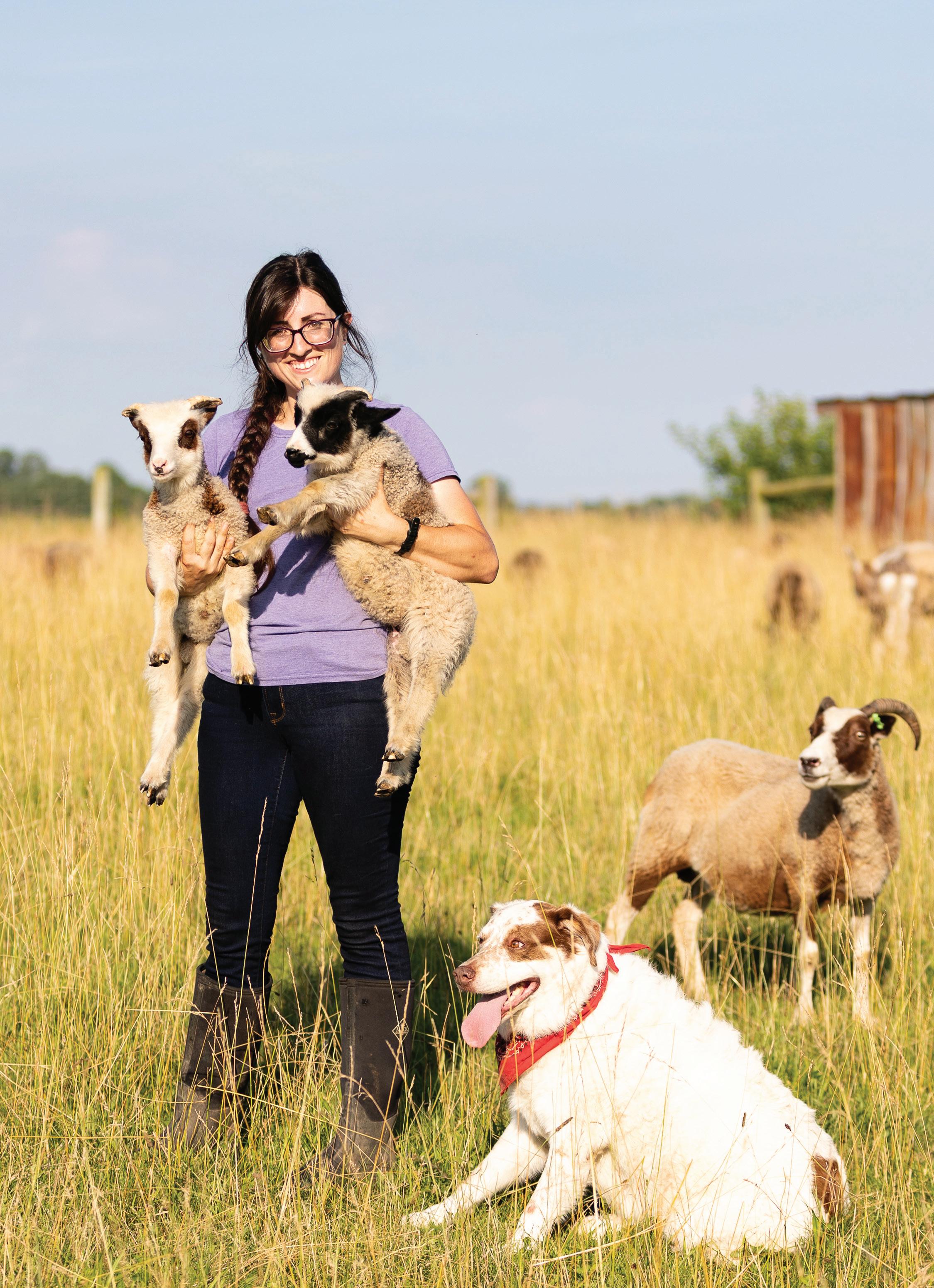
ALSO INSIDE
ALSO INSIDE
Protecting your power
Protecting your power
Scholastic sportfishing
Scholastic sportfishing
The Singing Cowboy
The Singing Cowboy
















Raising rare New service. New look. Same co-op you trust.

ALSO INSIDE
ALSO INSIDE
Protecting your power
Protecting your power
Scholastic sportfishing
Scholastic sportfishing
The Singing Cowboy
The Singing Cowboy
















As a member of an Ohio Electric Cooperative, you can help keep the rates stable and a ordable by reducing energy use during peak hours on hot summer days. The hottest times of day — usually between 2 p.m. and 6 p.m. — create the highest demand for electricity and when demand is high, so is the price. If we can reduce electric use during peak hours, we can reduce power costs for all members.



Here are a few simple ways you can help your cooperative “beat the peak” this summer by shifting your energy use to o peak hours:



Turn o unnecessary lights and electronics when they aren’t being used
Run your dishwasher and do laundry early in the morning or later in the evening
Shut blinds and curtains during the day to keep the sun from warming your home




Schedule your pool pump to run during o -peak hours

By adjusting the times you use electricity this summer, you can help us keep stable despite the heat! If we all work together, we all will benefit. That’s the power of cooperation and your electric cooperative membership.









Summer in Ohio brings hot weather — along with longer days that give us more time to enjoy it. But as we take in the season, it’s worth reflecting for a moment about something we rarely think about yet couldn’t live without: our electric power grid.
America’s power grid is an engineering marvel. It supports nearly every sector of our economy and underpins our national security. It delivers electricity across thousands of miles with remarkable speed and precision, powering everything from air conditioners to smartphones, from traffic lights to hospital ventilators. It keeps homes comfortable, grocery stores running, and factories moving. But it’s easy to take for granted.
For the vast majority of Americans, electricity is available at the flip of a switch, any time of the day or night. Behind that convenience lies a highly complex, carefully balanced system. The grid must constantly match supply with demand — in real time, through all seasons, and in any weather conditions. It’s not just about wires and poles; it also takes coordination, forecasting, cybersecurity, and loads of human expertise.
That’s why even modest threats to the grid’s stability deserve serious attention. Today, your electric cooperative and the entire electric utility industry face significant challenges to their ability to provide that always-on power.
Even as electricity demand continues to rise, especially from energy-intensive sectors like data centers, many of the most reliable sources of generation — coal- and natural gas-fired power plants — are scheduled to retire because of unrealistic environmental regulations and pressure from advocacy groups.
PJM Interconnection, which oversees the electric grid in Ohio and much of the surrounding region, has cautioned that if generation retires too quickly and new resources don’t come online in time, the grid could struggle to keep up, particularly during periods of severe hot and cold weather, when power is needed most.
We all must be thoughtful about how we navigate this situation. Your electric cooperative recognizes how essential a resilient grid is — not just for today’s needs, but for future generations, too. It’s with all that in mind that we’re constantly working with policymakers to support practical solutions that recognize our environmental responsibility but also ensure our ability to protect grid reliability and maintain the affordable electricity that powers our entire way of life.
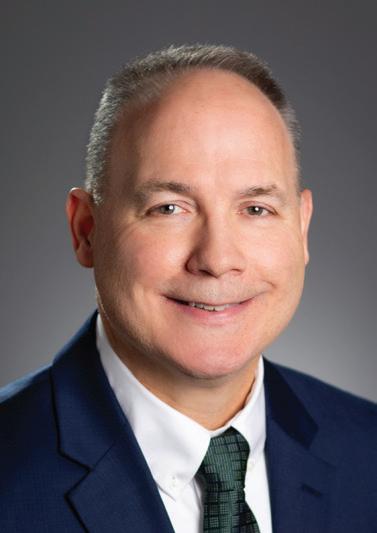
Craig Grooms
Your electric cooperative recognizes how essential a resilient grid is — not just for today’s needs, but for future generations, too.
6677 Busch Blvd. Columbus, OH 43229 614-846-5757 www.ohiocoopliving.com
Craig Grooms President & CEO
Caryn Whitney Director of Communications
Jeff McCallister Senior Managing Editor
Amy Howat Assistant Managing Editor
Neal Kindig Graphic Designer
Contributors: Tim Baldwin, Margaret Buranen, Colleen Romick Clark, Getty Images, W.H. “Chip” Gross, Shelby Moore, Catherine Murray, Deanna Norwood, Craig Springer, Mia Taylor, and Damaine Vonada.
OHIO COOPERATIVE LIVING (USPS 134-760; ISSN 2572-049X) is published monthly by Ohio Rural Electric Cooperatives, Inc. It is the official communication link between the electric cooperatives in Ohio and West Virginia and their members. Subscription cost for members ranges from $6.48 to $7.92 per year, paid from equity accruing to the member.
POSTMASTER: Send address changes to editorial and advertising offices at: 6677 Busch Boulevard, Columbus, OH 43229-1101. Periodicals postage paid at Berne, IN 46711, and at additional mailing offices. Nothing in this publication may be reproduced in any manner without written permission from Ohio Rural Electric Cooperatives, Inc. All rights reserved. The fact that a product is advertised in Ohio Cooperative Living should not be taken as an endorsement. If you find an advertisement misleading or a product unsatisfactory, please notify us or the Ohio Attorney General’s Office, Consumer Protection Section, 30 E. Broad St., Columbus, OH 43215. Periodicals postage paid at Columbus, OH, and at additional mailing offices.
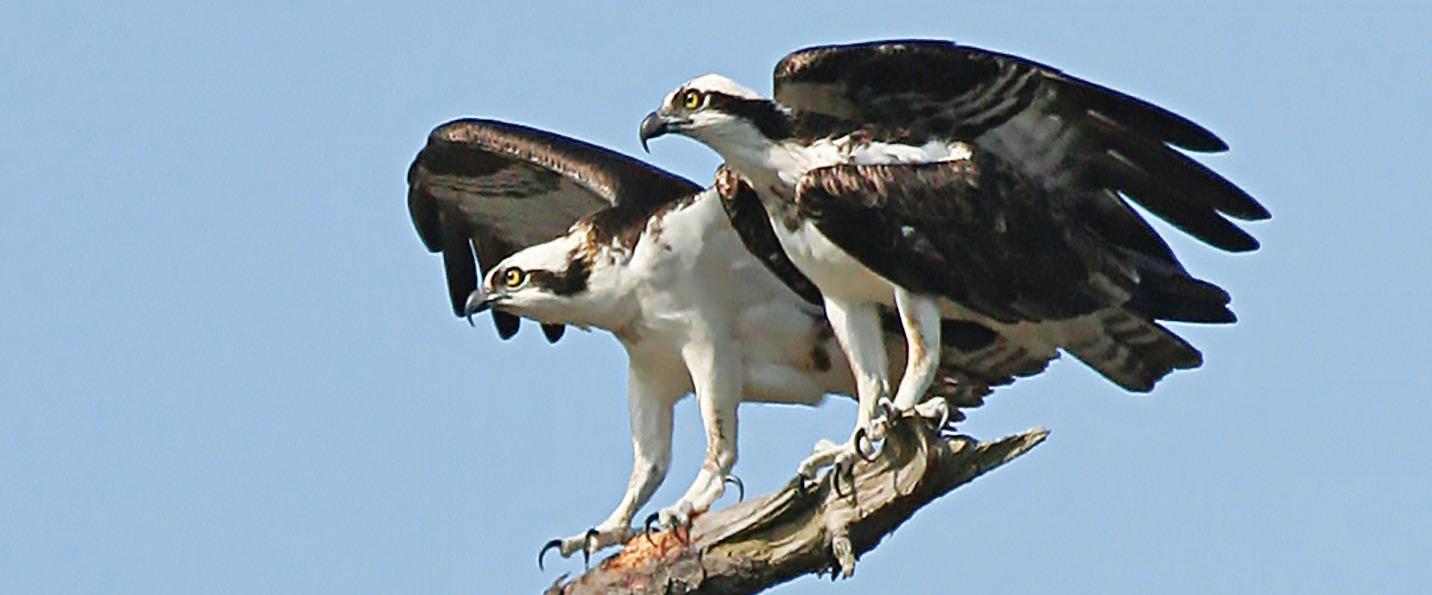
Moving day: Ospreys give co-op lineworkers a chance to learn new skills, protect wildlife, and prevent needless outages.
A breed apart: Co-op member raises both rare animals and awareness through her work with the Livestock Conservancy.
Discovered! 133 years after it went down, searchers find the tragic shipwreck Western Reserve at the bottom of Lake Superior.
Weeknight delights: Our reader recipe contest winners can add some variety to that weekly meal plan.
News and other important information from your electric cooperative.
National/regional advertising inquiries, contact Cheryl Solomon
American MainStreet Publications 847-749-4875 | cheryl@amp.coop
Please report changes of address to your electric cooperative. Ohio Cooperative Living staff cannot process address changes.
Alliance for Audited Media Member
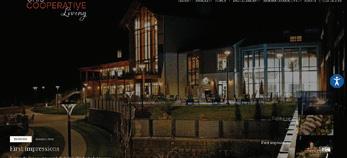
Visit Ohio Cooperative Living magazine online at www.ohiocoopliving.com! Read past issues and watch videos about our articles or our recipes. Our site features an expanded Member Interactive area, where you can share your stories, recipes, and photos and find content submitted by other co-op members across the state. 13 10 8 4 36 33
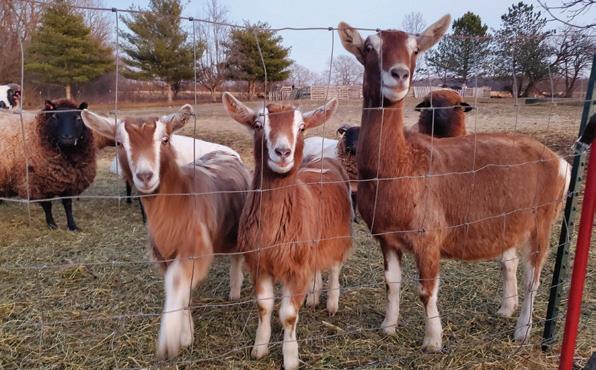
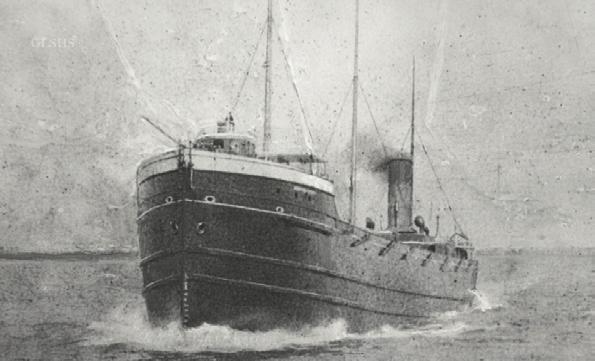

What’s happening: August/ September events and other things to do around Ohio.

Smiley dogs: Man’s best friends put their best faces forward in members’ pet portraits — including this one of Ranger, a smiling English shepherd rescue dog (submitted by Carol Anderson, South Central Power Company member).

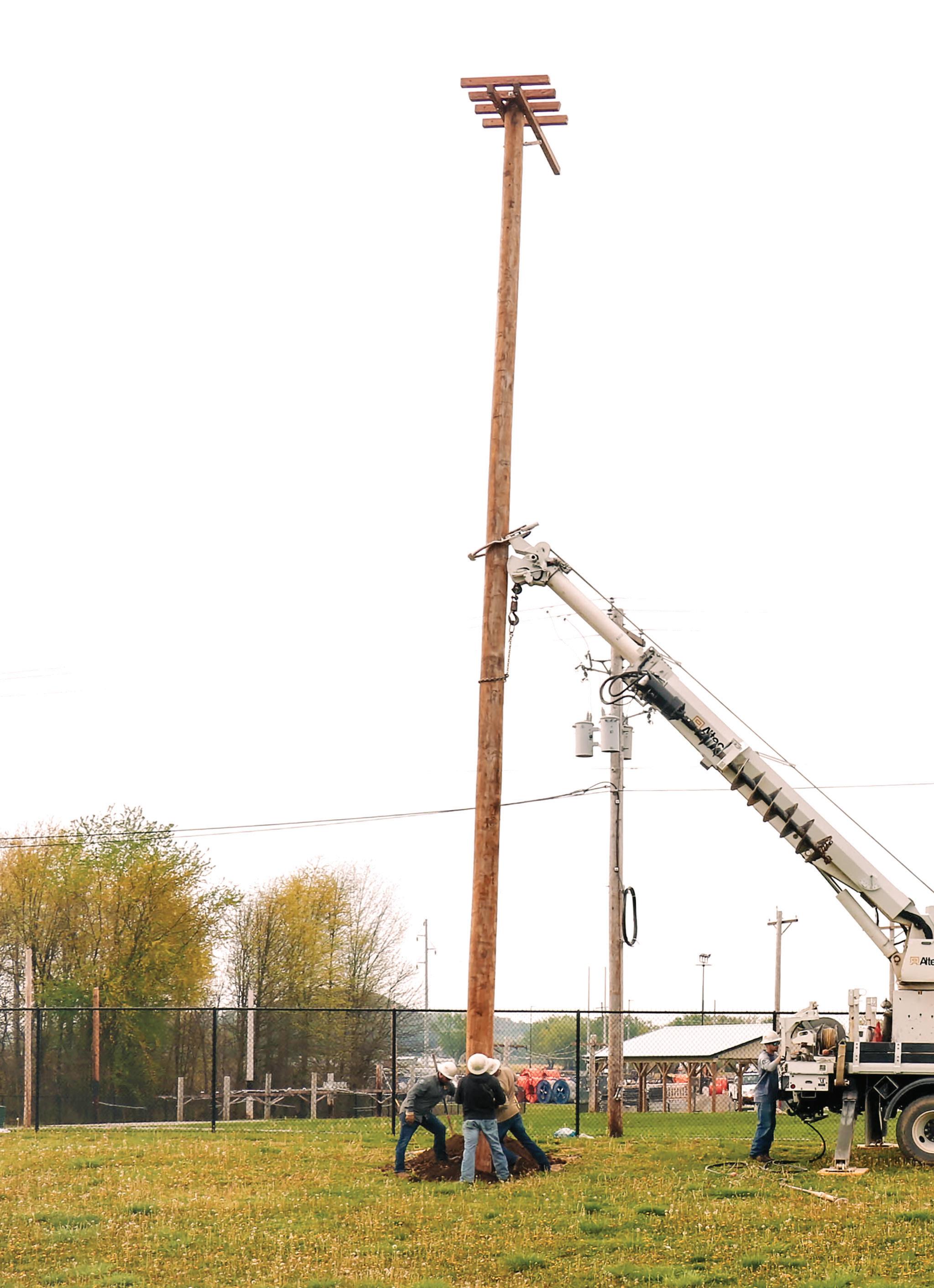
Ospreys give co-op lineworkers a chance to learn new skills, protect wildlife, and prevent needless outages.
BY MIA TAYLOR; PHOTOGRAPHS BY SHELBY MOORE
Brad Bussard and his team are accustomed to working almost invisibly. As a district line supervisor with Lancaster-based South Central Power Company, Bussard and the lineworkers he supervises often do their jobs — maintaining the electric lines that bring power to members’ homes and businesses — almost in the background of everyone’s daily life.
But on this day, they had a rapt audience, and he completely understood why.
It was the end of May, the time of year when ospreys return to Ohio from their winter home in Mexico, and a breeding pair had decided that one of the utility poles in the training yard next to the co-op’s office was a good spot to build a nest. The population of
ospreys, once nearly wiped out in the Buckeye State, has been steadily growing here since the Ohio Department of Natural Resources reintroduced them in 1996, to the point where the Division of Wildlife no longer even bothers to count them. The downside to that environmental success story, however, is that Bussard has been relocating nests from co-op poles multiple times per year for nearly two decades.
When most people think of power outages, they picture storms and downed trees — not ospreys. But Bussard, for one, knows that these feathered friends, which often grow as large as bald eagles, and their massive, messy
The process of moving an osprey nest off of power lines is not as simple as it might seem, involving engineering and design, navigating bureaucracy, and a hyper-interested audience.
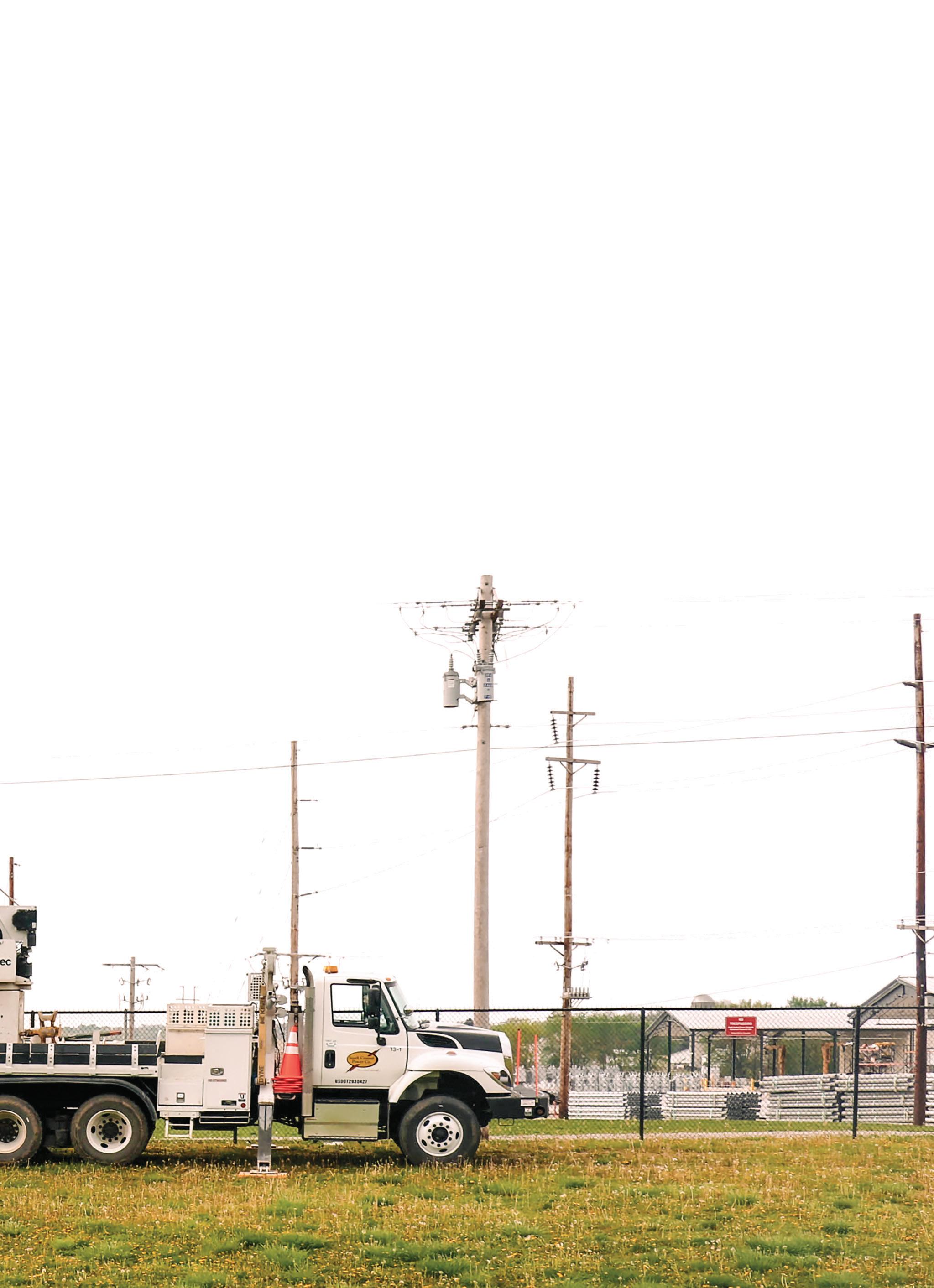
6-foot nests (also called “aeries”) can pose a significant risk to the grid.
Anytime a stray stick, a bit of excrement, or one of the birds themselves touches lines or other equipment at the top of a pole in a way that creates a short circuit, it causes a power outage — and probably also starts a fire that could destroy the pole and its equipment and potentially drop flaming debris to the ground and start a wildfire. If that touch comes from an osprey, it’s certainly fatal to the bird.
“Fortunately, the lines in the training yard aren’t electrified,” Bussard says, “so in this situation, it wasn’t going to cause an outage and there was no immediate danger to the birds.”
Instead, this particular nest was an opportunity to give some of the younger guys experience with an increasingly common duty that doesn’t typically come up during lineworker training.
Relocating an osprey nest isn’t as simple as just picking it up and putting it down somewhere else. It’s a process that typically takes about four lineworkers, a bucket truck or two, some ingenuity, and more than a little bit of patience. Timing, however, is key.
“The biggest thing is catching it early enough, when it’s still being built, so we can make it easier on the birds and decrease the window for potential outages,” Bussard says.
The first step to moving a nest is to get permission. Since ospreys are protected by the federal Migratory Bird Act, it’s illegal to capture the birds or move their nests without a permit. Next is to find a place to set a new pole that’s acceptable to the fish-eating birds. South Central’s resident ospreys feed from several stormwater retention ponds near the co-op’s office in the Rock Mill Industrial Park. “We try to get
Continued on page 6

Continued from page 5
them a better vantage point for hunting and fishing,” says Zac Reed, South Central’s director of engineering. “Can we get it to a higher elevation? Can we get them a more unobstructed view? Can we get it reasonably far away from our facilities? Those are things we look for.”
Once a proper spot is chosen and a new pole set, only then do lineworkers go up in buckets and actually move the nest. They carefully dislodge it from the (de-energized) lines and maneuver it onto a pallet to move it to its new location. Since ordinary pallets tend to rot away after a time, the engineering team came up with a safer and more permanent platform. “We’re using our treated crossarms and we build basically a little grid system up there,” Bussard says. “Then, we take some of our old scrap wire and put it up there to help lock their nest in place.”
The process typically takes only five to seven days from the time a nest is spotted in a dangerous location until it gets moved. And through it all, that rapt(or) audience pays particular attention. “We’ve never had an incident where they’ve actually come down and tried to attack or anything,” Bussard says. “They’ll patrol around, land on an adjacent structure for a while, and then they’ll patrol some more. They’re just constantly watching.”

You may not realize it, but your dairy farm is sitting on a free and renewable supply of energy. A WaterFurnace geothermal comfort system taps into the stored solar energy in the ground and uses it to provide savings up to 70% on heating, cooling, and hot water for your farm and home. They’re 2x more efficient and last 40% longer (25 years with geo vs 18 years with ordinary) than any other HVAC system. WaterFurnace is available everywhere in Ohio, so get in touch with a local dealer today to learn how geothermal can revolutionize your farm!

Co-op member raises both rare animals and awareness through her work with the Livestock Conservancy.
BY MARGARET BURANEN; PHOTOS BY DEANNA NORWOOD
Rachel LaRue grew up in the suburbs of Columbus, an area not generally thought of as “farm country.” Despite that, she says, she was involved in 4-H and “I always wanted to have a homestead with animals.”
So while her pathway to farming may not have been typical — she earned a degree in chemical engineering from Ohio University and still works as a chemical engineer — she’s living the life she loves on her Fleece and Feather Farm in Ashville, where she’s a member of Lancaster-based South Central Power Company.
But she says it was only a fluke that led her to become a member of the Livestock Conservancy.
That organization, based in Pittsboro, North Carolina, keeps track of rare breeds of sheep, horses, cattle, chickens, and other types of livestock — researching populations of dozens of breeds and rating their viability
from “critical” (fewer than 100 annual U.S. registrations) to “recovering” (over 2,500 annual U.S. registrations, but still in need of monitoring).
There are 77 Livestock Conservancy members in Ohio. LaRue got her start when she moved to her farm in 2018 and decided to acquire chickens as her first kind of livestock. She replied to an ad she found on Craig’s List for a seller who bred show-winning Dominique chickens.
He patiently explained to LaRue why he chose the heritage breed. “Dominiques are America’s oldest chicken breed,” LaRue says. “They came here from England with the Pilgrims.”
The Livestock Conservancy puts Dominiques in its “watch” category, meaning there are fewer than 2,500 annual registrations in the U.S. LaRue, who serves as secretary of the Dominique Club of America, keeps a



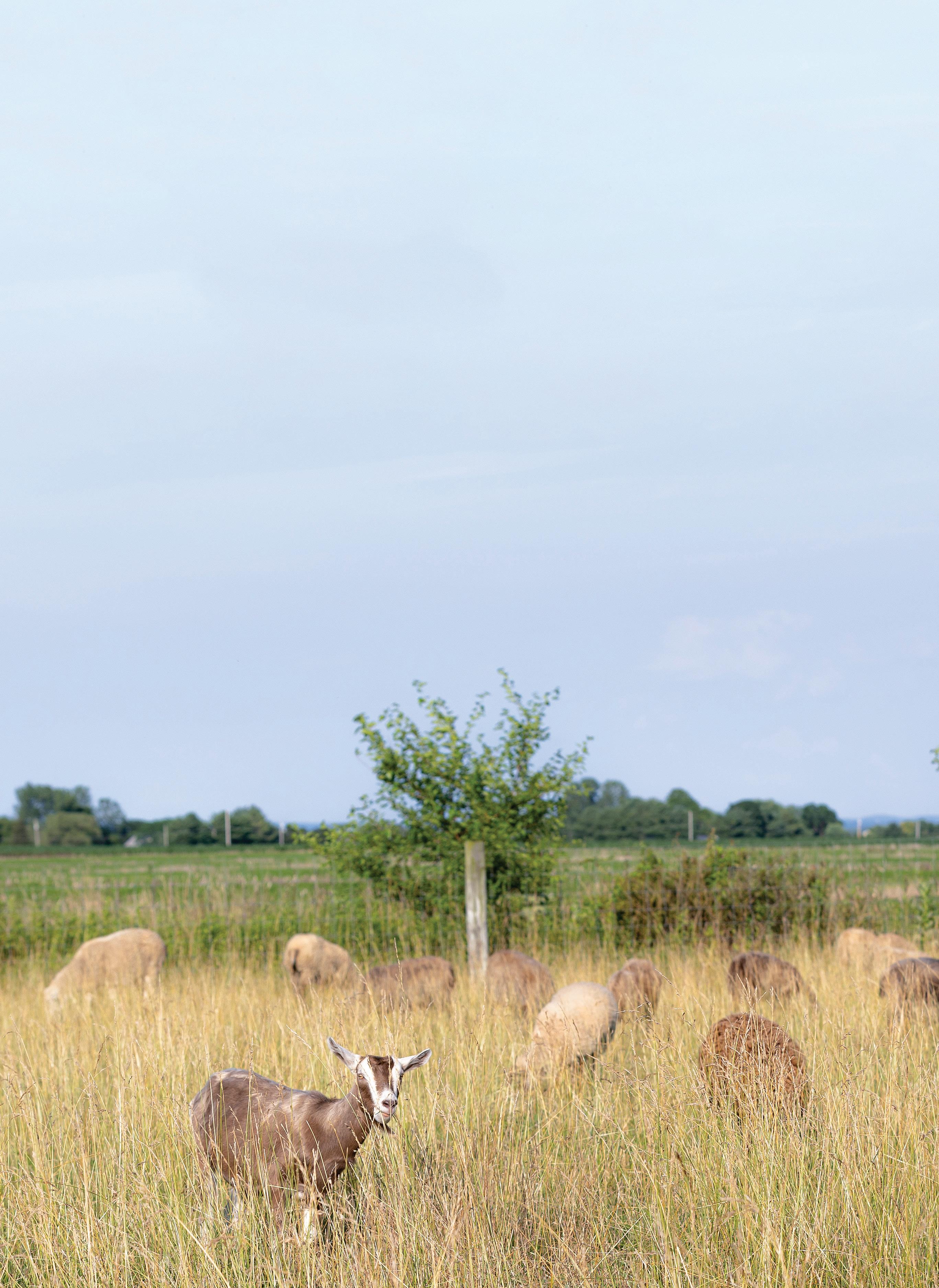
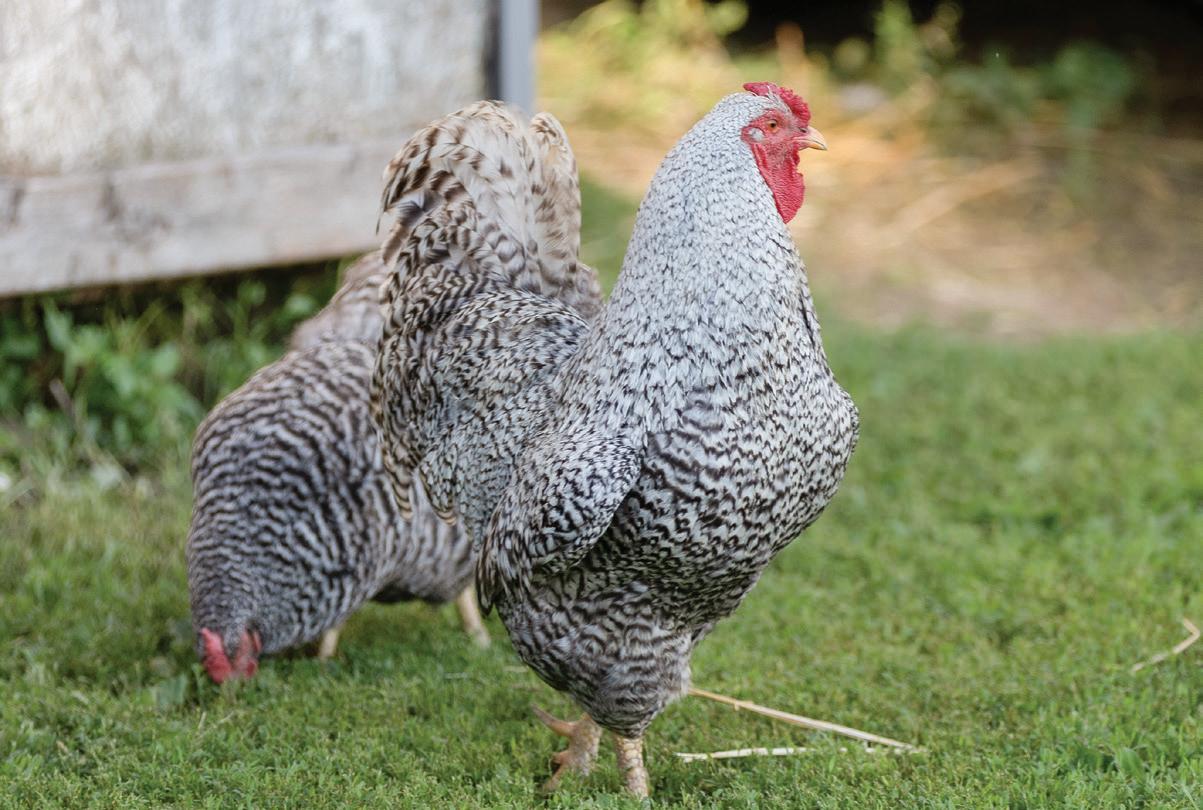

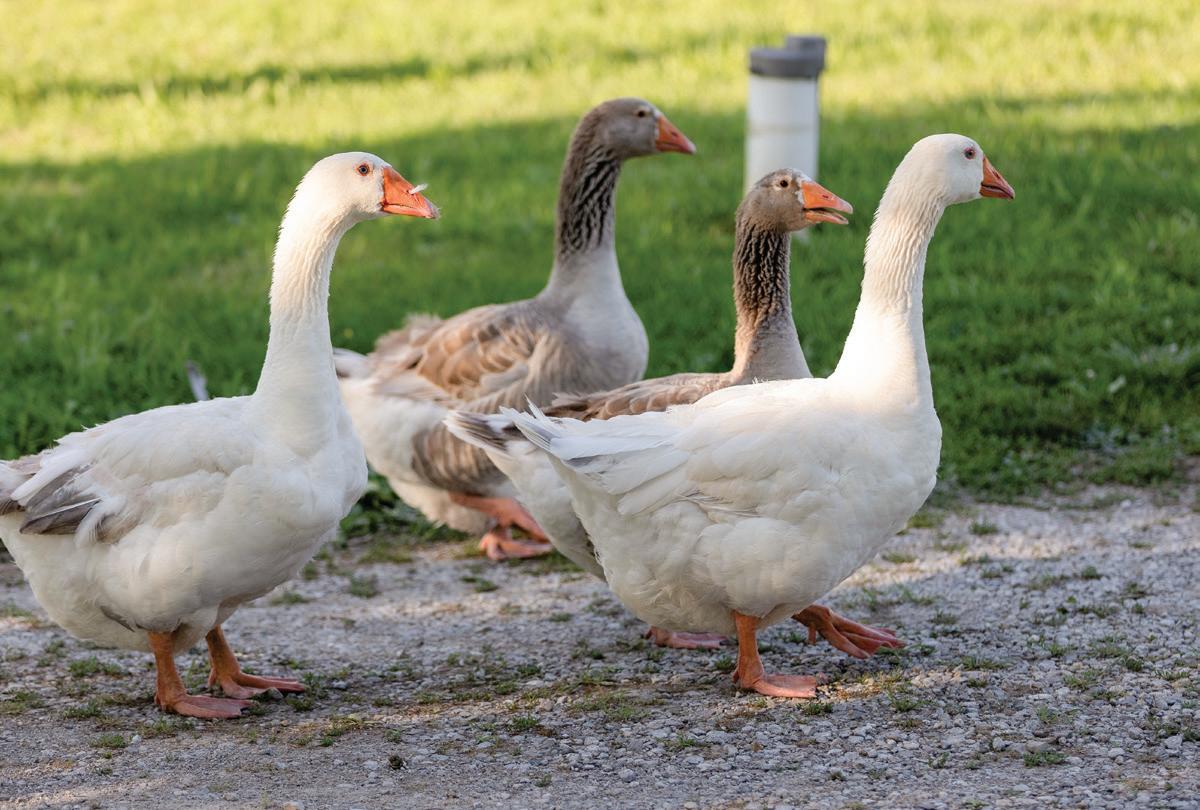

flock of 20 Dominiques, including two roosters. “I use them primarily for eggs, but they are suitable for meat, too,” she says. She has found her chickens to be “superhardy, smart, easy to keep, great mothers. They’re friendly and gentle around people, even the roosters.”
She says that people would be surprised “how hardy heritage breeds are. Even the first-time mothers are so protective of their babies. They’re very resilient against parasites. They’re not labor-intensive and they’re self-sufficient.”
Not long after, LaRue fell in love with Shetland sheep — a breed that goes back over a thousand years in Ireland and Scotland — when she saw the beautiful fleeces of their wool. Shetlands are a smaller sheep breed and provide both wool and meat, and LaRue has since learned to spin, crochet, weave, and knit. She currently serves as secretary of the North American Shetland Sheepbreeders Association.
The Livestock Conservancy also puts the Shetland on its watch list, and LaRue’s Shetland flock numbers 53, including two rams, which come from four different bloodlines. She selectively breeds for horned ewes, a less common trait within the rare breed.

LaRue says her sheep are friendly and follow her around like dogs do. “They will do anything for a treat. They are like pets, but being a wild-raised breed, not domesticated, they have a bit of a wild streak.”
LaRue’s third heritage livestock breed is her geese — four Pilgrims, a breed that the Livestock Conservancy classifies as threatened, with fewer than 1 ,000 annual registrations in the U.S. “Their primary purpose is serving as a predator deterrent for the chickens,” LaRue says. “They’ll go after a raccoon or a possum.”
Besides helping to preserve heritage livestock breeds, LaRue is proud that her farm has earned the Animal Welfare Approved certification from A Greener World. The label means that the animals are raised by the highest humane and sustainable farming methods.
The other livestock residing at Fleece and Feather Farm are not of heritage breeds. The Toggenburg dairy goats provide milk for drinking and making cheese (she also makes soap with it). Her guinea fowl “are great for tick control, and they act as watchdogs. They’re mostly quiet, but they sound the alarm if a hawk or a delivery truck arrives.”
For more information about the Livestock Conservancy, visit https://livestockconservancy.org.
BY W.H. “CHIP” GROSS
On Aug. 30, 1892 (133 years ago this month), the steel freighter Western Reserve went down during a furious gale on the Great Lakes, taking 27 souls with her.
The 300-foot steamer remained hidden from that day until just last summer, when it was located 60 miles northwest of Whitefish Point, on the far eastern end of Lake Superior, by members of the Great Lakes Shipwreck Historical Society. The find was not made public until March 10 of this year, after the society had formally contacted the descendants of its owner, Capt. Peter G. Minch, who was one of the casualties along with his wife, Anna, and their children, Charlie, age 9, and Florence, age 6, as well as Anna’s sister, Mary Englebry, and her daughter, Bertha, age 10
Though the tragedy happened on Lake Superior, the most northerly, largest, and deepest of the Five Sisters, the story has many ties to the Buckeye State.
First, of course, is its name, which honored the historic 3-million-acre tract of land in northeast Ohio that was once claimed, or “reserved,” by the state of Connecticut. The ship, one of the first lake freighters built entirely of steel plate, was constructed by the Cleveland Shipbuilding Company in 1890. And Minch, the millionaire shipping
magnate, was born near Erie, Ohio, in 1842. The Western Reserve was the pride of his fleet; the ship was so fast, it earned the nickname “the inland greyhound.”
So it was in August — one of the least likely months of the year for major storms on the lakes — that Minch decided to treat his family to some relief from the heat and humidity of a Midwest summer by taking them on a cruise aboard his famous freighter. The ship was scheduled to travel from Cleveland to Two Harbors, Minnesota, where it would pick up a load of ore.
The journey went smoothly as the Western Reserve steamed across Lake Erie, up the Detroit and St. Clair rivers, and northward over Lake Huron to the St. Marys River, which links to Whitefish Bay, the easternmost point of Lake Superior, at Sault Ste. Marie. But as they entered Whitefish Bay, the wind and weather began changing rapidly. Before long, the waves had grown to gigantic heights, and at about





9 p.m., the Western Reserve began breaking apart at the seams; it sank within only a few minutes.
Most of those aboard, miraculously, were able to abandon ship. Minch and his family escaped in a wooden lifeboat while the crew clambered into a second, metal lifeboat. The metal lifeboat quickly capsized, though two of the crew were able to somehow reach the wooden lifeboat and were taken aboard.
discovery. “It just reinforces how dangerous the Great Lakes can be — any time of year.”
At the time of the sinking, speculation was that the ship had been made of steel that was too brittle, causing the ship to twist in two on the tall waves. Two months after the disaster, the Western Reserve’s sister ship, W.H. Gilcher, which had been built at the same time and with similar mill runs of steel plate, disappeared on Lake Michigan. The ensuing investigation led to changes in the types of maritime steel approved for use in American and Canadian shipbuilding.
Some 6,000 shipwrecks have occurred on the Great Lakes, with more than 30,000 people losing their lives. Lake Erie, the shallowest of the five lakes, has one of the highest concentrations of shipwrecks anywhere in the world. More than 2,000 ships have gone down on Erie, but only 400 of those wrecks have been located.
The remaining lifeboat containing Minch, his family, and the two crew members drifted toward land for 10 hours throughout the night before it, too, capsized, about a mile from Lake Superior’s southeastern shore. Miraculously, one of the crew members — a wheelsman named Harry H. Stewart — survived to tell the tale.
“Every shipwreck has its own story, but some are just that much more tragic,” GLSHS executive director Bruce Lynn said as he announced the
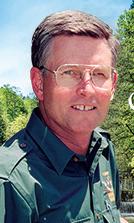
To make their discovery, the GLSHS team searched a grid pattern for two years, using both side-scanning sonar and a remotely operated vehicle. The wreck revealed that the Western Reserve had broken cleanly in two, the bow now resting atop the stern in 600 feet of water.
One final tie-in to the Buckeye State: The only artifact thus far recovered from the Western Reserve is a light (top photo), which is currently housed at the National Museum of the Great Lakes in Toledo (https://nmgl.org). A matching light seen by the remote vehicle was one of the ways the searchers confirmed they had found the ship.





































Whether you’re a meticulous meal-planner who knows what’s on the menu a week in advance or a seat-of-the-pants type constantly able to pull something together at the last minute, it can be frustrating to feel like dinnertime is a series of the same meals coming around over and over like a culinary merry-go-round.
For our 2025 Ohio Cooperative Living Reader Recipe Contest, we asked co-op members for their go-to weeknight dinner recipes that make the whole family happy — quick and easy yet delicious, nutritious, and satisfying. We think the winning entries are worthy additions to that repast rotation.
Deb DeLoye of Sidney says it was probably 30 years ago that she was at a holiday dinner gathering where her friend served a light and tasty Southwestern-style casserole that just knocked everyone’s socks off. “I asked her for the recipe right then and it’s been in the ‘favorites’ section of my recipe box ever since,” she says. “I’ve probably made it five or six times a year for the last 30 years.”
DeLoye says Tato Taco Casserole works because it’s fresh and light (especially for a Southwestern dish), and because she just seems to always have all the ingredients on hand. “It’s a meal all by itself, and it comes together in under an hour,” she says. “And if there are any leftovers, they warm up well in the microwave.”
For the winning entry in this year’s contest, DeLoye, a member of Piqua-based Pioneer Electric Cooperative, will receive an Ohio-made KitchenAid stand mixer.
BY JEFF MCCALLISTER; PHOTOGRAPHS BY CATHERINE MURRAY

Reader recipe contest winners can add some variety to that weekly meal plan.
Joyce Reer of Shelby and her family operate a sugar shack full time when the sap starts running in the early spring, and she says her Macadamia French Toast, one of the runners-up in our contest, takes full advantage of it.
“We love breakfast for dinner at times,” says Reer, a member of Attica-based North Central Electric Cooperative. “We still make maple syrup the old-fashioned way, so it’s a treat to be able to use it whenever we can.”
Her recipe takes a little advance planning, soaking bread slices all day (or overnight if you’re having this breakfast dish for breakfast), but it comes together in next to no time for dinner — rewarding the earlier work with a sweet, crispy toast covered in buttery macadamias, just waiting to be drenched in that maple syrup.
Elisabeth Bodey of St. Paris says her Chicken Divan recipe is slightly deceiving in that she didn’t enter it exactly as she normally prepares it. She and her husband, Jesse, also members of Pioneer Electric, are the parents of five boys ranging from 6 to 16 years old, so a single batch isn’t nearly enough for all of them.
Bodey says the dish is an old family favorite that she grew up making and eating — and since she has seven siblings, it’s likely her mom never made it without doubling (or tripling) it, either.
“It’s super easy to assemble,” she says, “and since you use precooked chicken, it’s fast too. I probably make it at least once a month, and my kids never complain.”
Turn the page for this year’s winning recipes!
Deb DeLoye, Pioneer Electric Cooperative member
Prep: 15 minutes | Cook: 35 minutes | Servings: 4
Crust
1½ cups instant potato flakes
8 ounces dairy sour cream
2/3 cup water

1 pound ground beef 1 ounce packet taco seasoning
cup water
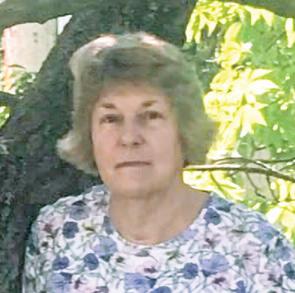
Additional toppings shredded lettuce diced tomatoes sour cream
Preheat oven to 350 F. Combine the crust ingredients. Press crust mixture into a greased 13x9-inch baking dish. Bake for 20 to 25 minutes or until crust is lightly browned.
In a skillet, brown the ground beef and drain off the fat. Add the taco seasoning and the water into the skillet with the ground beef. Stir to combine. Simmer uncovered for 15 minutes. Spread the ground beef mixture evenly over the baked crust. Sprinkle the crushed corn chips over top of the beef mixture. Then sprinkle the cheddar cheese over the corn chips. Put the casserole back into the oven for 5 to 10 minutes, until cheese has melted.
Let casserole cool for 5 minutes. Cut into squares to serve. Top each serving with shredded lettuce, diced tomatoes, and sour cream as desired.

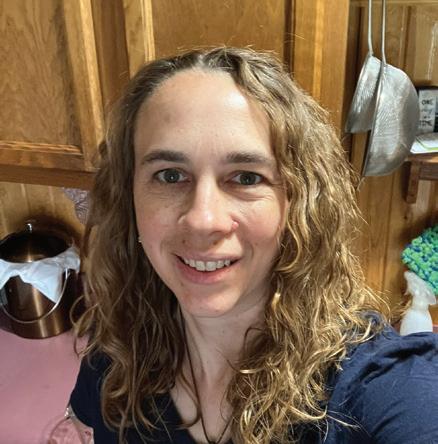
Elisabeth Bodey, Pioneer Electric Cooperative member
Prep: 15 minutes | Bake: 30 minutes | Servings: 4
1 cup rice
2 cups water
½ teaspoon salt
10 ounces frozen, chopped broccoli
1 pound precooked chicken breast, diced
1 tablespoon + 1 teaspoon lemon juice, divided 10.5-ounce can cream of chicken soup
¼ cup mayonnaise
½ teaspoon curry powder
1 cup shredded cheddar cheese
¼ cup panko breadcrumbs
Cook the rice in water with the salt. While rice is cooking, start the casserole. Preheat the oven to 350 F. Steam broccoli until just tender. Grease an 8x8-inch pan. Spread the chicken and broccoli in the pan and sprinkle with 1 tablespoon lemon juice. In a small bowl, mix soup, mayonnaise, curry powder, and 1 teaspoon lemon juice. Spread over the chicken and broccoli. Spread cheese on top, sprinkle with breadcrumbs, and bake for 30 minutes, or until cheese is melted and casserole is bubbly. Serve over rice.

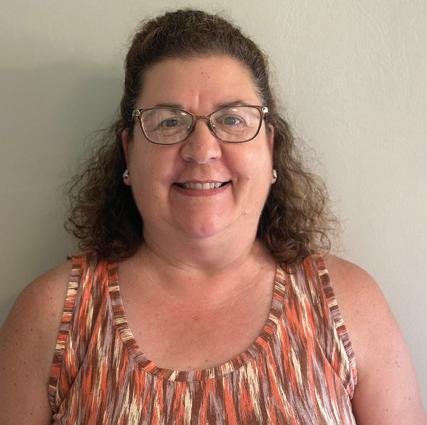
Joyce Reer, North Central Electric Cooperative member
Prep: 15 minutes | Chill: 8 hours | Bake: 25 minutes | Servings: 6 to 8
1 loaf (1 pound) French bread, cut into 1-inch slices
4 eggs
2/3 cup orange juice
1/3 cup milk
¼ cup sugar
½ teaspoon vanilla extract
¼ teaspoon ground nutmeg
½ cup butter or margarine, melted
½ cup chopped macadamia nuts
powdered sugar and maple syrup, optional
Arrange bread slices in a greased 9x13-inch baking dish. In a bowl, whisk the eggs, orange juice, milk, sugar, vanilla, and nutmeg until blended; pour over bread. Cover and refrigerate for 8 hours or overnight.
Pour butter into a 10x15x1-inch baking pan. Transfer bread slices to prepared pan; sprinkle with nuts. Bake uncovered at 400 F for 20 to 25 minutes or until bread is golden brown. Dust with powdered sugar and serve with syrup.

print Submission deadline: August 16, 2025
We are looking for photography submissions from electric cooperative members to be considered for use in our 2026 wall calendar. Appropriate subjects include landscapes, wildlife, floral, and seen-around-town photos .
• One photo entry per household.
• High-resolution, color, digital images only.
• Only JPEG or TIF file formats will be accepted.
• Please send submissions by email attachment only to photo@ohioec.org.
• Photo format must be horizontal and capable of filling an 8x11-inch image area.
• Provide an explanation of the photo — the where, what, when — as well as who took the photo.
• Include your name, address, phone number, and the name of your co-op.
• Pictures taken in Ohio will be given stronger consideration.
Winning submissions will receive a cash prize!
Scan the QR code for more information:


RANDY PRICE PRESIDENT AND CEO
ome stories begin with a problem that seems impossible to solve. In 1935, rural communities across Paulding County faced exactly that kind of challenge. The big power companies looked at the distances, counted the costs, and delivered their verdict: serving rural areas wasn’t economical. Too far. Too expensive. Too risky.
But the people of Paulding County saw things differently. They understood something those distant corporations didn’t — electricity isn’t a luxury, it’s a lifeline. So, they did what determined communities do when nobody else will: they rolled up their sleeves and built their own solution. Paulding Putnam Electric Cooperative was born from that gritty determination, founded by neighbors who believed their families deserved the same opportunities as anyone else.
From humble beginnings — sharing office space with Reinhart Chevrolet on the corner of Perry and Main, housing trucks alongside the livery stable — Paulding Putnam began stringing lines to places others wouldn’t go. The “REA Circus” traveled from farm to farm, teaching families how electricity could transform their daily lives — from lighting their homes to powering their equipment. What started with 2,400 members in 1941 has grown to nearly 14,000 today, but the mission remains unchanged: bringing essential services to the communities that need them most.
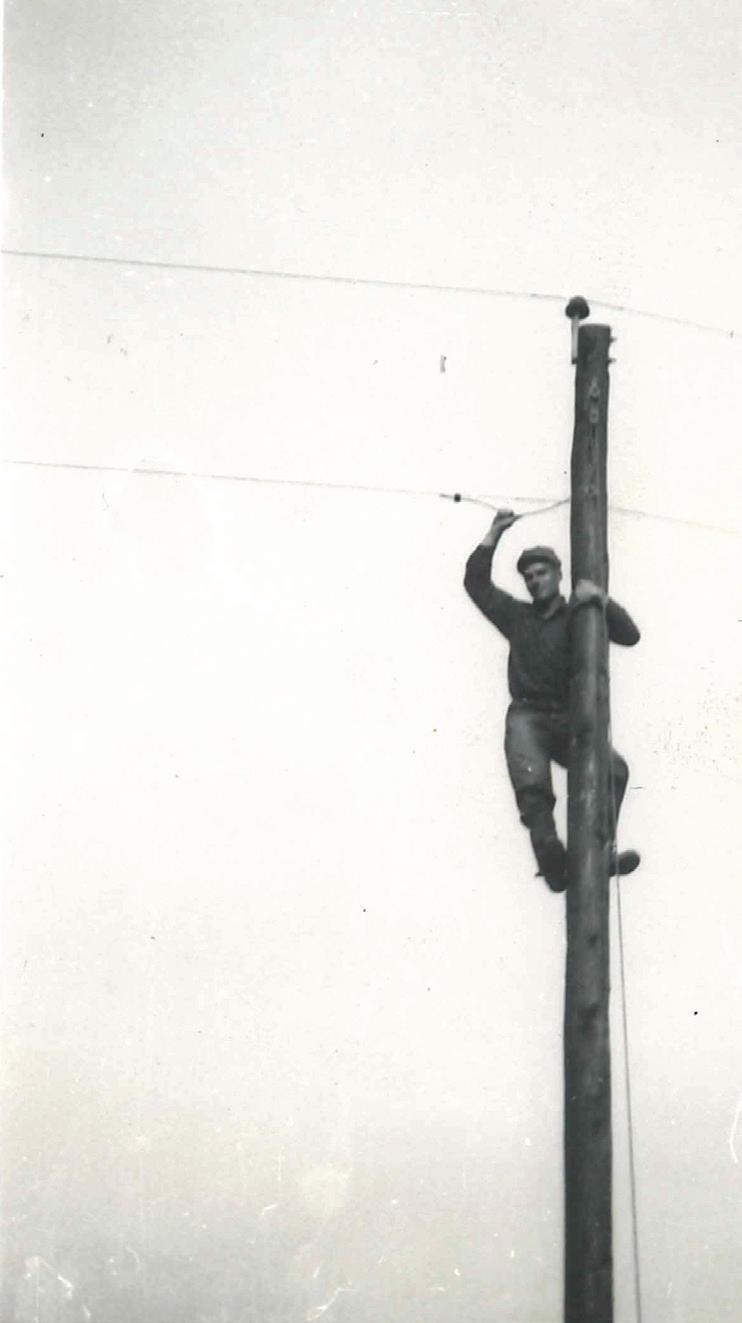
PPEC lineman Pete Donat installs new electric lines in Carryall Township along Road 7, circa 1942. This photo was shared with us from Paulding Putnam member Jerry Balser. Jerry, Pete’s uncle, shared that he became a lineman to help bring power to the rural farms of Paulding County.
Fast forward to July 2024, and history was repeating itself. Our board of trustees looked across our service territory and saw a familiar problem. Nearly 70% of our membership — especially those in rural areas — were unserved or underserved when it came to reliable, high-speed internet. Sound familiar? Once again, the big providers were saying the same thing their predecessors said about electricity 90 years ago: too far, too expensive, too risky.
Just like our founders, we saw things differently. These days, reliable internet isn’t a luxury — it’s essential for everything from remote work and telehealth to staying connected with family and running a modern farm. So, our board made the same kind of bold decision that created this cooperative in the first place: if nobody else will reliably serve our communities, we will.
We surveyed our membership and the broader community to understand their needs and frustrations. What we heard was clear: 33% of respondents gave their current internet provider lower ratings because their service was too slow or inconsistent. People were tired of paying for promises that weren’t delivered.
Continued on page 18
A new service deserved a new brand to unite our electric and internet offerings as one. After last year’s member survey, we simplified our name to what you already call us: Paulding Putnam. Our revised logo now tells our complete story — the lightning bolt across the two P’s represents our electric heritage, while a new cable swoosh symbolizes our new fiber internet offering. Two essential services, one trusted cooperative.
On July 12 , 2025 , at our Member Appreciation Day, we dramatically unveiled our new brand with the installation of our updated front office sign. It was more than just a logo change; it was a declaration that we’re ready for the next chapter of serving our communities.

symmetrical upload and download speeds, no contracts, no data limits, no hidden fees — just reliable, fast internet designed specifically for our community.
Our branding may look a little different, but make no mistake: We’re the same local, not-for-profit cooperative you’ve known and trusted for 90 years. We’re still owned by our members, still governed by neighbors you know, and still committed to the principle that essential services shouldn’t be a privilege based on where you live.
What’s changing is our capability. We’re bringing the same superior support and service you’ve experienced with our electric operations to high-speed fiber internet: residential speeds up to 1 gigabit per second with
This isn’t just about faster downloads or smoother streaming, though you’ll certainly get both. This fiber network strengthens our electric infrastructure too, enabling better communication between our equipment and shorter power outages. It’s an investment that benefits every member, whether you choose internet service or not.
We’re the same cooperative that brought power to rural areas when nobody else would. Today, we’re bringing the next essential service to communities that deserve better. Because at Paulding Putnam, we don’t just serve customers — we serve neighbors. We don’t just provide utilities — we power possibilities.
A legacy of POWER. A future of CONNECTION. That’s the local cooperative difference you can trust.

Paulding Putnam’s fiber internet set to transform local education

As the school year kicks off this August, a powerful new tool is coming to homes across northwest Ohio and northeast Indiana — one that won’t fit in a backpack, but will carry students far: high-speed fiber internet from Paulding Putnam.
Set to connect its first homes this fall, Paulding Putnam’s broadband initiative will deliver reliable, high-speed fiber internet to rural communities that have long struggled with slow, spotty, or unaffordable service. The impact will be transformative for students and educators alike.


“In today’s modern society, everything we do revolves around the internet,” says Tom Taylor, Superintendent of the Western Buckeye Educational Service Center, which supports multiple area school districts. “Students are taking college classes online, accessing assignments through Google Classroom, and participating in remote learning. Without reliable high-speed internet at home, they’re missing out on all of that.”
The digital divide is especially severe in rural communities. National data from the FCC shows that rural students are 1 6 times more likely to lack highspeed internet at home than their urban peers.
At Paulding Exempted Village Schools, 82 students — about 6% of the population — reported no internet access at
all. School board member Julie Arend believes that number underrepresents the true struggle.
“I would argue there are many more — my family included — who deal with unreliable internet,” Arend says. “It’s incredibly frustrating when your child can’t complete a project, log into Google Docs, or even attend e-learning days because your Wi-Fi cut out.”
During the pandemic, many schools pivoted to digital learning — a trend that hasn’t gone away. From online testing and homework platforms to virtual tutoring and digital textbooks, education now assumes students can stay connected at home.
And in many districts, students are provided with laptops, but not the internet they need to use them. “We’re getting kids halfway there,” Taylor says. “They have the device, but if they live in a rural area without reliable internet, they’re still at a disadvantage.”
Today, some textbooks are even online. “Things have changed so much just since I graduated 16 years ago. Reliable internet is no longer a luxury — it’s a necessity.”
Paulding Putnam’s fiber internet — with speeds up to 1 Gbps — will allow students to video conference with teachers, submit assignments instantly, participate in digital classrooms, and even explore post-secondary opportunities from their homes.
“It only takes one missed assignment or day of class to fall behind,” Arend adds. “This new reliable service will help prevent that from happening.”
Taylor sums it up simply: “This will be a very good thing for all our students and families in the area.”
Arend agrees — both professionally and personally. “It’s exciting to see how PP is always looking to expand and enhance Paulding County and the surrounding areas. I’m thankful Paulding Putnam is investing in our communities!”

As electricity demand rises across the country — especially during extreme summer heat or freezing winter spells — electric cooperatives like Paulding Putnam are working behind the scenes to keep power reliable and affordable. One key tool in this effort is the Peak Alert. But what exactly is a Peak Alert, and how can responding to it help save money for everyone?
A Peak Alert is a message issued by Paulding Putnam to notify members that electricity use is reaching a high point — also known as a “peak” — on the grid. These alerts typically occur during the hottest afternoons of summer or the coldest mornings of winter, when air conditioning or heating systems are working overtime. During these times, the cost for the co-op to purchase wholesale power skyrockets due to high demand across the regional power grid.
Electricity isn’t stored like gas in a tank; it has to be generated and delivered in real time. When demand surges, more expensive and less efficient power plants may be called upon to meet the need. That drives up the cost of power for your cooperative, and those costs eventually get passed on to you, the member.
By reducing electricity usage during peak times, Paulding Putnam can lower the amount of high-cost energy it needs to purchase. This doesn’t just help for that day — it can actually reduce our long-term wholesale power costs and infrastructure expenses. Many generation and transmission utilities use peak demand data to determine rates for the entire year. Lower peaks = lower costs.
When a Peak Alert is issued, we’re asking you to voluntarily reduce your electricity use for a few hours — usually in the late afternoon or early evening. Here are a few simple ways to help:
• Delay running large appliances like dishwashers, washers, and dryers
• Adjust your thermostat by a few degrees
• Turn off unnecessary lights and electronics
• Close blinds to keep out direct sunlight

Every time our members respond to a Peak Alert, we reduce our cooperative’s peak demand, which directly impacts our power bill. These savings help keep rates stable, support infrastructure upgrades, and ensure that we can continue to deliver safe, reliable electricity to all our members.
In short, Peak Alerts are a powerful example of how working together as a cooperative community can create real, lasting savings for everyone. When you respond to a Peak Alert, you’re not just cutting your own energy use — you’re helping your neighbors and strengthening the future of your co-op.
Stay connected with us on social media and sign up for our alerts to help us beat the peak and save together!

YOU WON’T FEEL THE DIFFERENCE WHEN YOU ADJUST THE THERMOSTAT BY A FEW DEGREES, BUT YOUR BANK ACCOUNT WILL.

There’s no need to cool an empty house if you’re away from home during the day. By programming your thermostat, you can save 100+ dollars per year and the house will still be comfortable by the time you get home. Take control of your energy use by using our energy calculators on our website.
Remember, when it comes to saving energy, you have the power!
Find out how the little changes add up with enhanced home use data, available within SmartHub. Learn more about it at www.PPEC.coop/efficiency-projects-tips.

Being part of the community is at the heart of everything we do, which is why we love attending local events like the parades in New Haven, Indiana, and Van Wert, Ohio. These gatherings give us the perfect opportunity to connect with our members face-to-face, share a few smiles, and celebrate the communities we proudly serve. There’s nothing better than seeing familiar faces along the parade route, waving back at the community that makes our work so rewarding. We’re honored to be part of our hometown traditions! Keep an eye out for us in your neighborhood and be sure to say hello.


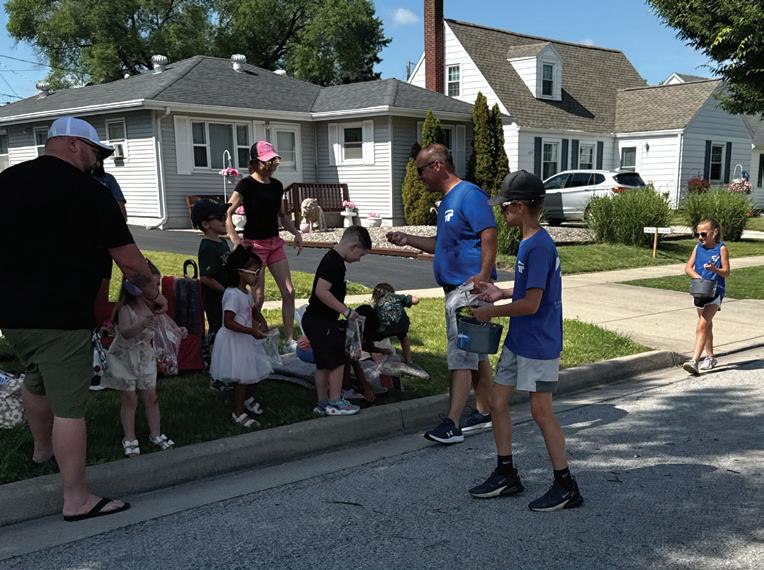


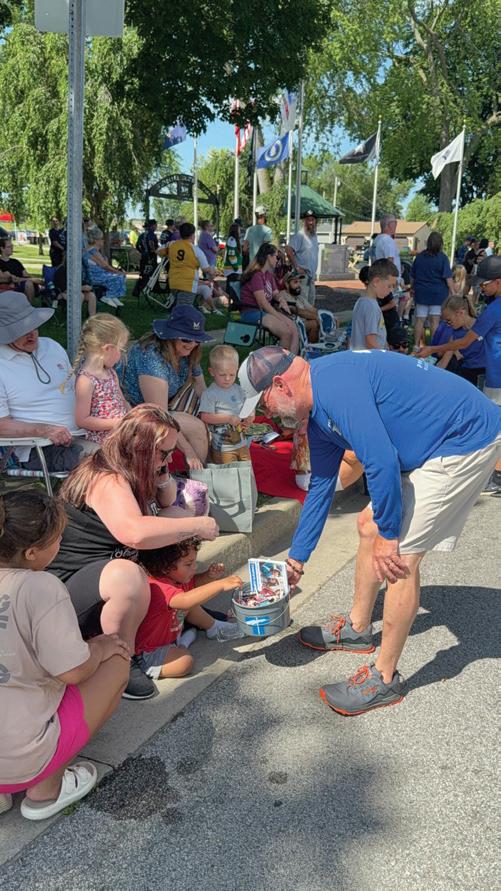
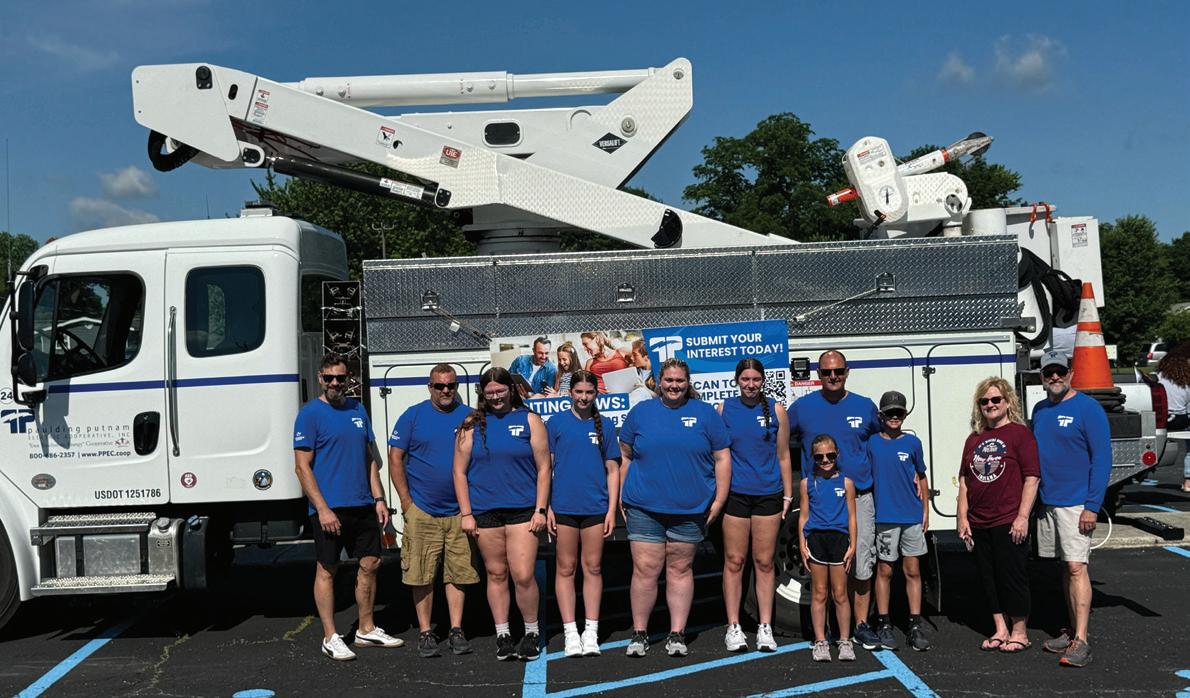
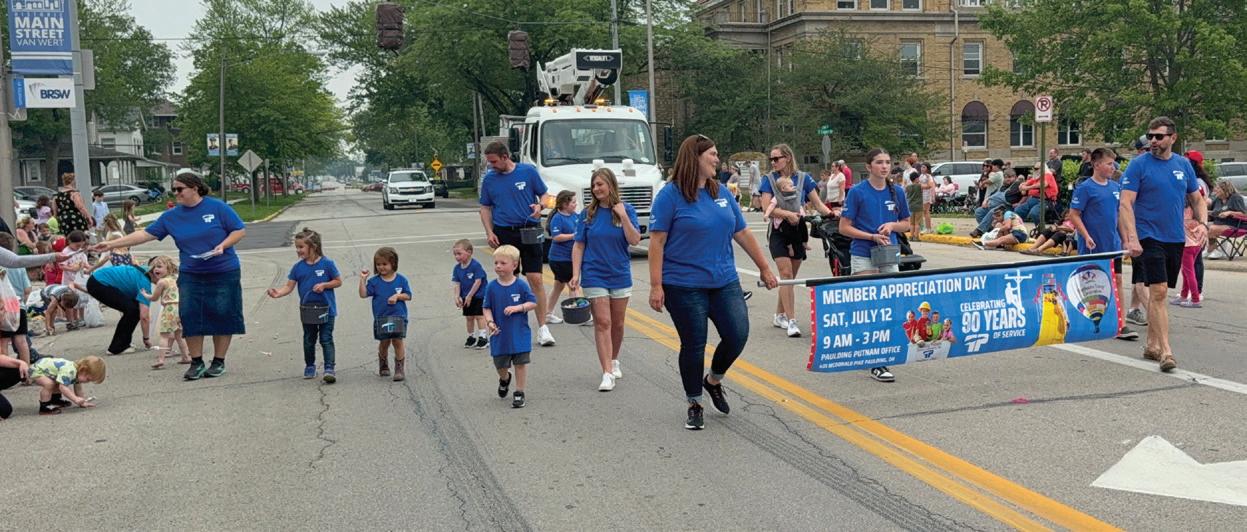

Contractor crews are hard at work splicing fiber on parts of our newly constructed lines as part of Paulding Putnam’s fiber-optic internet service. Splicing fiber involves carefully connecting individual strands of fiber optic cable to create a seamless, continuous network capable of transmitting data at the speed of light.
This process requires precision and skill, as each fiber strand is thinner than a human hair. Once complete, the fiber ring will serve as the backbone of our highspeed broadband network, bringing fast, reliable internet to members across our service territory and helping bridge the digital divide in our rural communities.

As of late June, contractors have installed over 160 miles of line. (By the time you read this, that number will be even higher!) Work has begun on the installation of node cabinets that will be installed at substations as well as other strategic locations.
As we work toward the first members having service in fall 2025, details
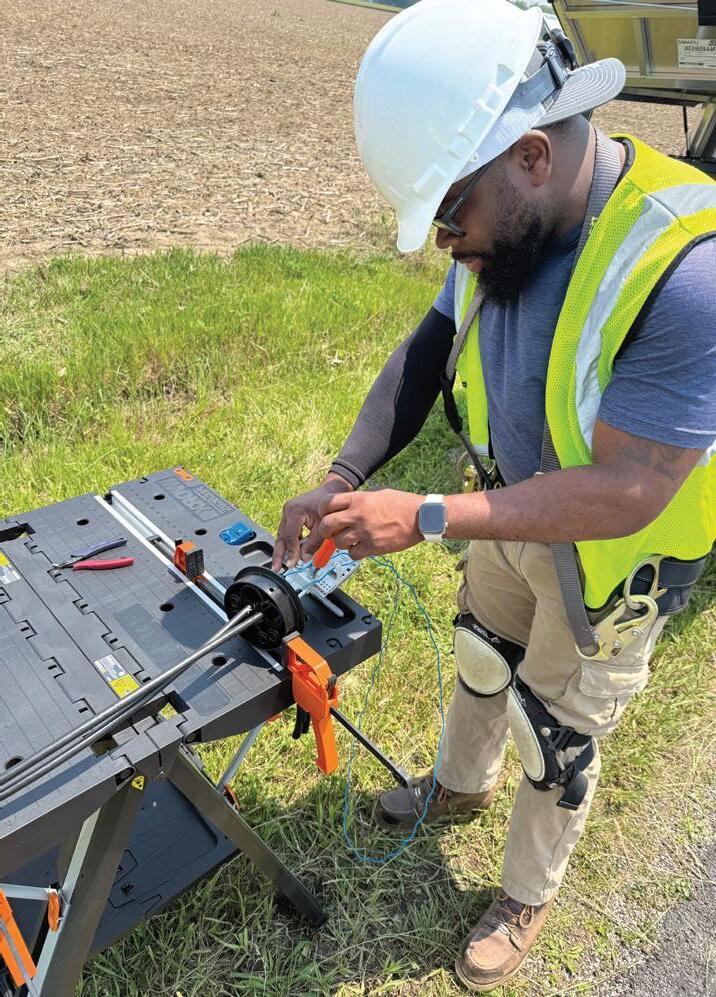
about our new lifestyle internet packages are now available online at www.PPEC.coop. Our updated website features a new fiber internet tab, where you can see construction updates, view plans, and search your address. Submit our form to tell us that you want our service! This will help guide our efforts of where to build next.
Visit www.PPEC.coop/fiberupdates to learn more and submit our form!



We need your help to locate past members so they can receive the refunds due to them. A list of individuals and businesses that have unclaimed capital credits can be found on the co-op’s website, PPEC.coop/capital-credits or by stopping into the office.
These former members’ refunds were returned “undeliverable” by the U.S. Postal Service. If you recognize a name on the list, notify the person.
If the person is deceased, let one of their relatives know about the unclaimed check.







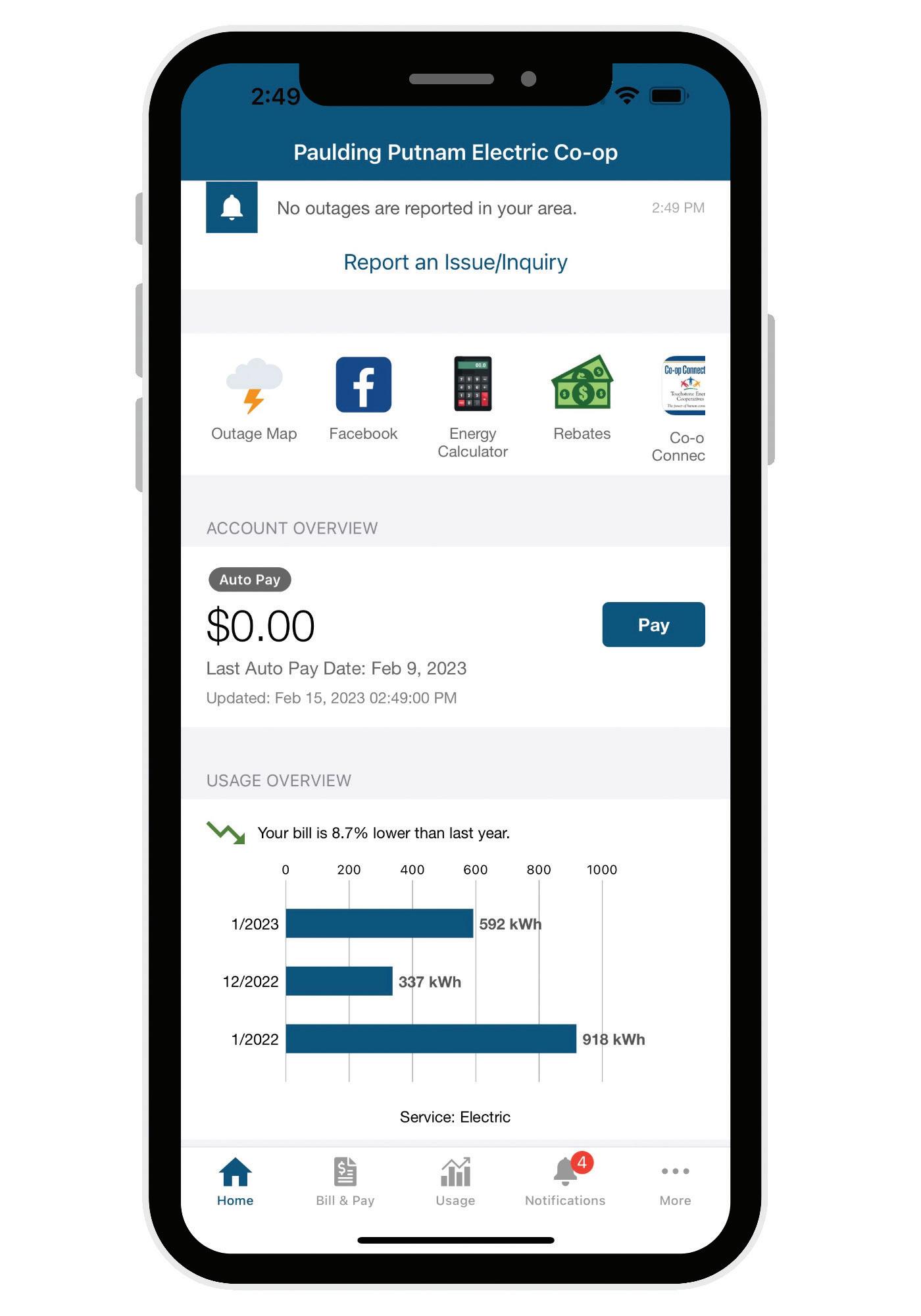





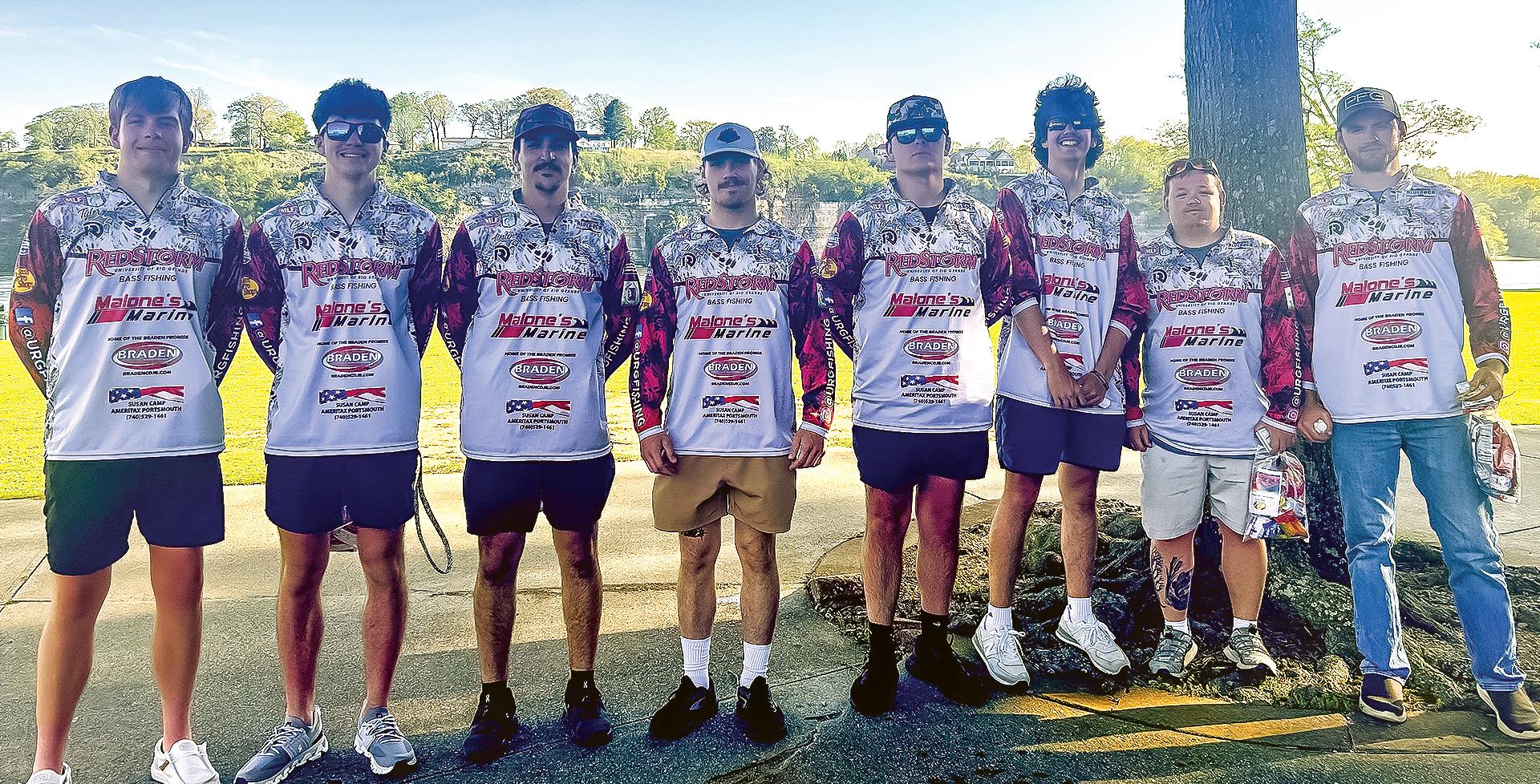
BY MARGARET BURANEN
Even though competitive bass fishing isn’t yet recognized as an official school sport in Ohio, it is catching on with young people here.
Through local clubs across the state, volunteers teach students — from third grade through college — about fishing and help host competitions at various lakes around Ohio. The clubs, such as Cincinnati Youth Bass Club and Northwest Ohio Junior Bassmasters, are affiliated with groups such as the Student Angler Federation and Ohio Bass Nation, which promote bass fishing among young people.
“I’ve had so many parents whose kids don’t play traditional sports tell me, ‘This is the only thing my kid loves,’” says Tasha Burgess of Hamilton, who serves as the volunteer youth director for Ohio Bass Nation.
“Fishing grows their confidence in themselves, and they’re making lifelong friends.”
Competitive bass fishing is strictly catch and release. Teams of two, using only artificial baits that look like worms or crawdads, drop their lines in a specified area. Each competitor catches a maximum of five fish, which must be kept alive in water-filled wells on the boats. As soon as the fish are quickly weighed and photographed, they are released back into the lake. The winning team is determined by the total weight of the fish caught.
For safety, every boat is operated by an adult so that the two young competitors can concentrate on their fishing.
“Kids get up at 4 o’clock in the morning and they’re out there for six to eight hours, working their tails off,” Burgess says. “It could be 95 degrees or 35 degrees, and they want to be fishing. They’re incredible kids.”
Ohio Bass Nation holds two tournaments for students in the fall and two in the spring. Winners advance to compete in the state championships. State winners




qualify to compete in the national championships, to be held this year in Georgia. Two members of the Cincinnati club, Maddie Dawson and Colten Porter, won this year’s Ohio state championships and will compete in the national contest.
Burgess keeps track of entries and countless other details for OBN’s youth tournaments. That work is done when she’s not busy at her full-time job managing financial matters for the Department of Biology at Miami University in Oxford.
Burgess fished for catfish with her dad when she was young, and her husband, John, competes in numerous bass fishing tournaments, but, she says, “I’m not an avid bass fisher. For me, I’ve always loved being outdoors and it’s more about helping the kids.”
Her involvement with youth fishing began when their son, Cameron, had to quit playing ice hockey. The only other sport he liked was fishing, and getting involved with youth club fishing has allowed Cameron to compete in several states.
Now he’s attending the University of Rio Grande in southeast Ohio on a fishing team scholarship.
During the winter months, most of the fishing clubs meet indoors. Burgess says that the kids work on knot-tying and other skills and also learn about conservation. All the while, they’re not only experiencing the fun of competition, they’re also making friends who share the same interest. There is another large benefit: the chance, at each competition, to earn scholarships.
Burgess says that the kids like being outside and with other kids. “They enjoy trying to read the water [temperature and clarity], the challenge of figuring out what bait the fish want.”
Burgess says that more volunteers are needed so that more kids can participate in fishing.
“One fishing club in Ohio Bass Nation has a waiting list of over 100 kids,” she says.
Erratic glacial stones serve as monuments to Ohio’s distant geologic past.
BY CRAIG SPRINGER

Here’s a word lesson. Erratic: to lack a fixed course or uniformity; to wander or deviate from the ordinary. Now, let us apply that to Ohio’s geology, which is anything but ordinary.
The largest stones in Ohio aren’t from here. They are erratics — granite and basalt migrants from the north, boulders that were picked up in Canada and strewn about ... erratically — seemingly without any pattern or uniformity. How did they get here? Well, some background first.
What is past is prologue. In other words, that which has happened before our present time sets the context of the current age. And so it is with Ohio’s geologic past: a pageant of events over protracted bygone eras that go back an inconceivably long time, so long you can hardly wrap your mind around it. And yet here it is, right at our feet (mostly).
If you need a reminder that the world is held together by stone, then consider Ohio’s basement. You cannot see it except in the long strands of bored-out cores that have been extracted from hundreds of feet below the earth’s surface. The basement is composed of

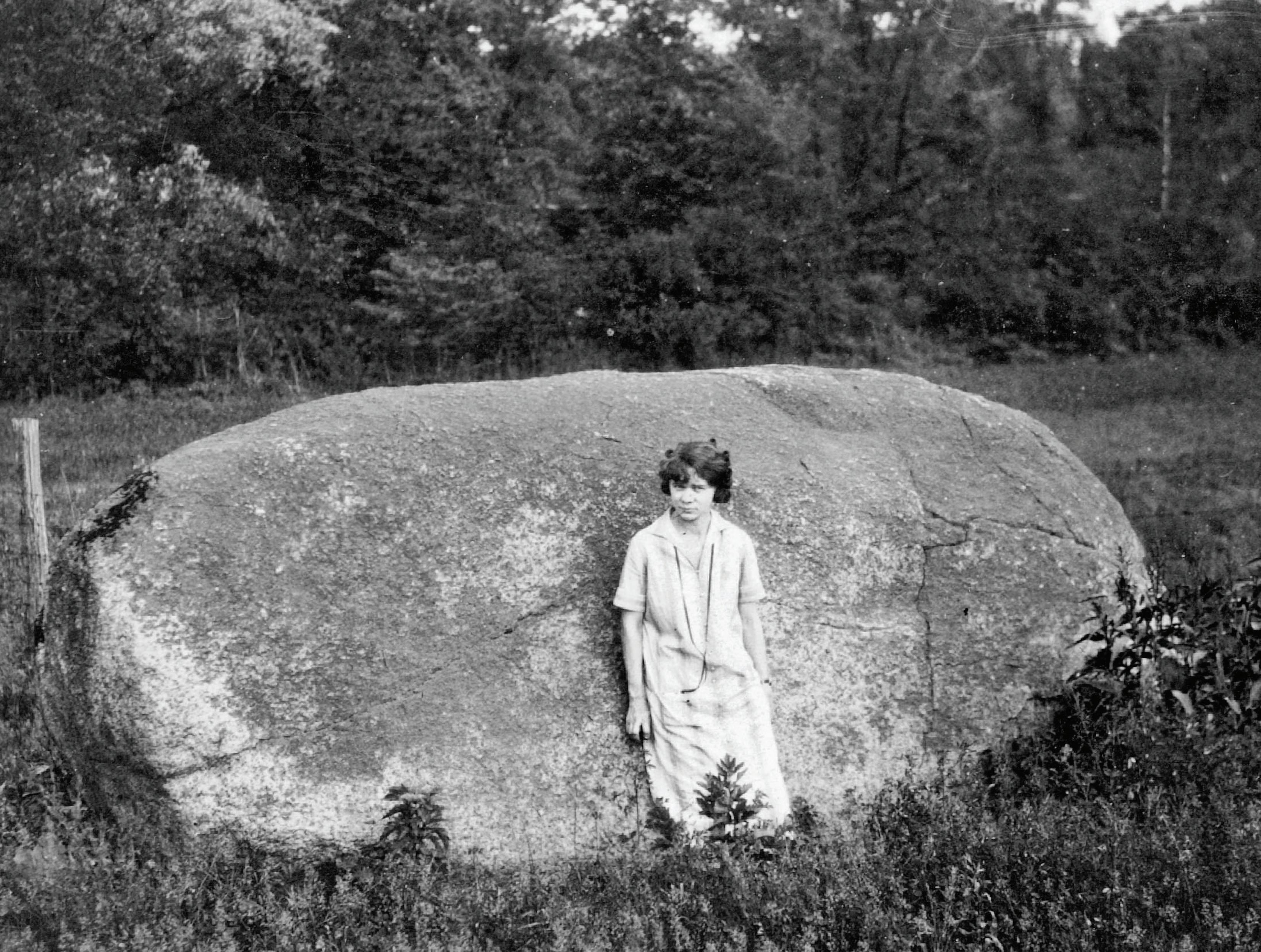
sedimentary rock, settled and compressed at the bottom of what was once a deep ocean. That bedrock dates to about 570 million years ago, geologists say. It’s called Cambrian period stone, named after Cambria (which is now called Wales), where the stone type was first described and given a name around 1835.
Above the Cambrian, right up to the ground you walk on in Ohio’s central, western, and southwestern parts, lie rocks from the Devonian and Silurian periods. Those names, too, come from across The Pond: the town of Devonshire, England, and the Silurians, an ancient Celtic tribe.
Those rock formations, a mere 350 million years old, were the first to entomb fossilized shells and other organisms from that ancient sea, which explains how the official state fossil is of a marine species discovered near Dayton.
More recently (though still in the far distant past), Ohio endured the Pleistocene epoch, a cold and crushing ice age that started about 2 6 million years ago. The frigid climes brought glaciers down from Canada, covering two-thirds of Ohio with ice a mile thick. The glaciers
gathered up rocks and anything else in their path, grinding away that old sedimentary stone as they crawled slowly southward. Only the southeast part of the state, the Appalachian Piedmont, was spared the icy erosion. And then, about 12 ,000 years ago, a warming trend. As the massive ice sheets retreated back to the north (where they remain today), they dropped their rocky contents out of the melting ice, hundreds of miles and thousands of years from where they came. Typically, erratic stones lack sharp edges, having been subjected to tumbling, grinding, and polishing by the slow but abrasive contact with ice and the fine soils that were also shoved along by the glaciers.
You can find granite cobbles and boulders individually or clustered in small groups or bands throughout glaciated Ohio, but it is at the point of the glaciers’ greatest advance, roughly in a line from what is now Clermont County northeastward toward Columbiana County, where they are most plentiful. They are strewn erratically in creek beds and on farm fields, or revealed from just below the surface amid piles of earth excavated for new construction.
There are a few notable erratic stones around the state, not the least of which is the Sunbury boulder, which sits on what is now private property in Delaware County. It is a massive 22 feet long and 72 feet around at its base. The part of it that’s visible likely weighs 200 tons — though no one knows for sure how much more of it is buried.
The stones are of little economic value in and of themselves, though they do possess ornamental value as landscape specimens — if you can move them — and some erratics are large and prominent enough to draw in a tourist or two. More often, they’re likely to be a nuisance to agriculture and engineering, damaging farm implements and requiring heavy machinery to get them out of the way.
But to a geologist, erratic stones possess an intrinsic value. They provide maps to the past, revealing how the thick ice flowed, where they originated, and how long ago the ice dropped them.
So erratic glacial stones, in essence, are monuments — both to the deep, cold past and to the here and now. Each impressive rock is a tombstone that marks the exact spot where the glacier that carried it across the continent gave up the last of its energy and could carry it no farther.
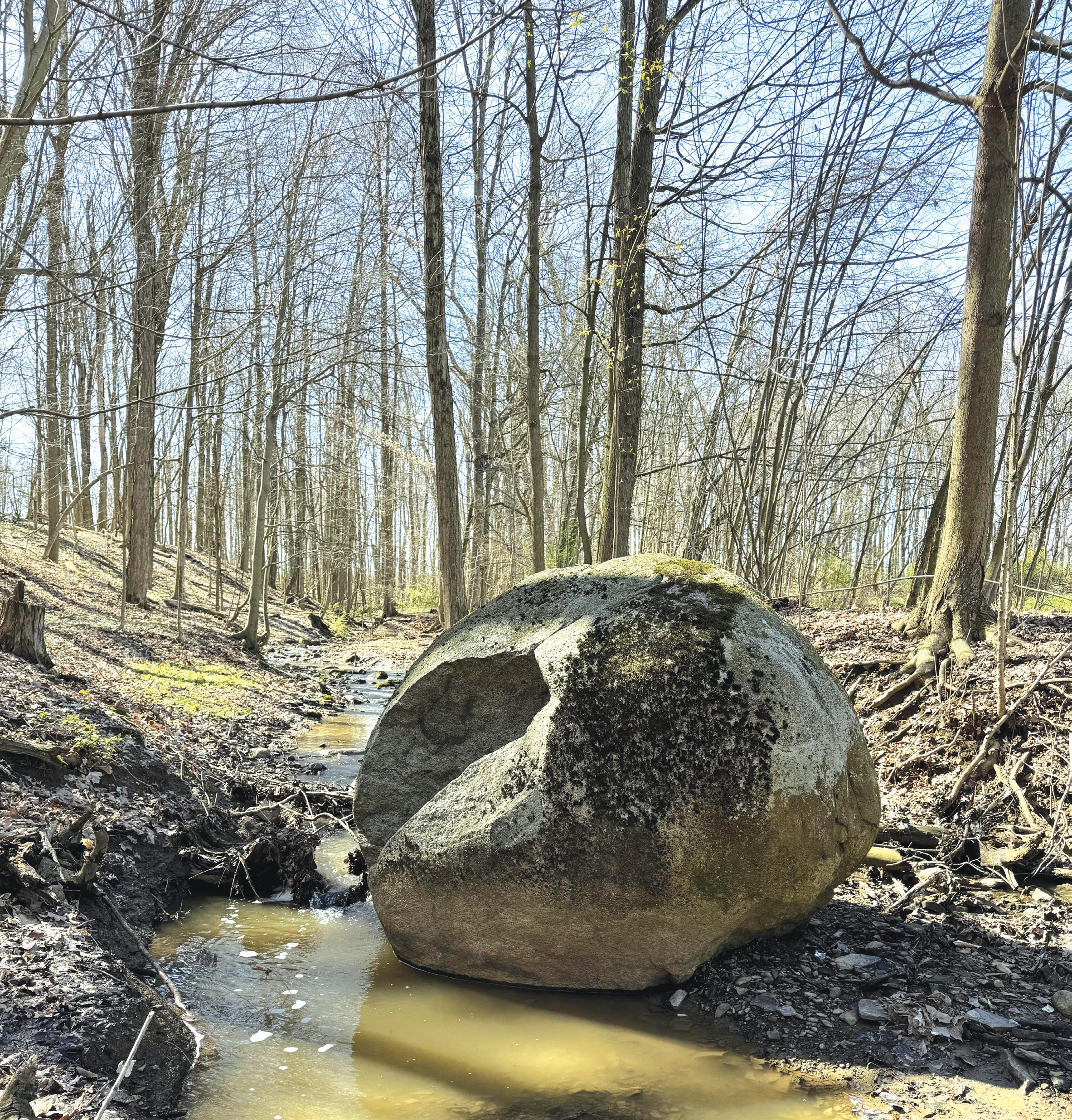

Up for grabs for the next 21-days: Casino Rolls loaded with rarely seen American Eagle Ike Large Dollar Coins just like the old Casino Slots paid out, all coins are decades old and never to be minted again by the U.S. Gov’t
“It’s like hitting the jackpot on an old Vegas Slot Machine decades ago,” said Mary Ellen Withrow.
That’s because for the next 21 days everyone can get these rarely seen ‘Old Vegas’ Casino Rolls, but only those who beat the 21-day order deadline.
These full 15 count ‘Old Vegas’ Casino Rolls are filled with historic American Eagle Ike Large Dollar coins like the ones from 1976 and earlier that were used decades ago in slot machines in the world famous Casinos.
It’s amazing that these Old Vegas Casino Rolls are up for grabs. Just holding one in your hand reminds you of walking down the Vegas Strip in the glory days of Elvis, Dean Martin, Frank Sinatra, Sammy Davis Jr., Peter Lawford and Joey Bishop. It just makes you feel good.
“I’ll tell you this, it’s the best gift you could ever give someone. It’s actually the perfect gift for any occasion. Everyone you give one of these ‘Old Vegas’ Casino Rolls to will never forget your generosity and they’ll be the envy of all who see them,” Withrow said.
“We’re bracing for thousands of U.S. residents who will be calling to get these ‘Old Vegas’ Casino Rolls over the next 21 days. That’s because these rolls are not torn, faded, ripped or beat up. They are in brand-new pristine collector condition. And here’s the best part. These are full 15 count ‘Old Vegas’ Casino Rolls loaded with the same American Eagle Ike Large Dollar Coins like the coins used to fill the world famous casino slot





machines decades ago, and there can never be any more so there’s no telling what they could one day be worth,” Withrow explained.
Today’s callers need to remember this. These are not ordinary rolls of coins you get at a bank or credit union. These ‘Old Vegas’ Casino Rolls contain old American Eagle Ike Large Dollar coins commemorating the Rat Pack days of the early 1970’s when Las Vegas Casinos were all the rage. These rolls are now being released from the private vaults at the Lincoln Treasury, each with 15 U.S. Gov’t issued American Eagle Ike Large Dollar Coins dating back to 1976 and earlier. We won’t be surprised if thousands of people claim the six roll limit before they’re gone. That’s because after the rolls were
sealed with these U.S. Gov’t minted American Eagle Ike Large Dollar Coins, each verified to meet a minimum collector grade quality of very good or above, the dates and mint marks are unsearched to determine collector values and the rolls are now securely sealed. That means there’s no telling what’s in each roll.
“My advice, get as many as you can, stash them away in a safe place to pass down from generation to generation,” Withrow said.
“Just imagine how much these remaining ‘Old Vegas’ Casino Rolls could be worth someday. The American Eagle Ike Large Dollar Coins alone are decades old and are never to be struck again by the U.S. Gov’t,” Withrow confirmed.
Withrow knows a thing
or two about money, she is retired 40th Treasurer of the United States of America and now is the Executive Advisor to the Lincoln Treasury.
All readers of today’s newspaper publication trying to be the first to get the Free Dollar Coin with every ‘Old Vegas’ Casino Roll just need to call the Hotline at 1-888-706-6528 and give the Promo Code IKE222 beginning at 8:30 am this morning.
The TollFree Hotlines are expected to be overwhelmed. That’s why everyone hop-


ing to get their hands on these ‘Old Vegas’ Casino Rolls are being urged to call right away. If lines are busy keep calling. All calls will be answered over the next 21 days.




Minted in Philadelphia, Denver and San Francisco featuring a majestic eagle swooping over the moon’s surface commemorating the original Lunar Landing.





The Call-In Hotlines open at 8:30am (EST) this morning. Callers who beat the 21-day Release deadline are guaranteed to get them for less than $6 per coin that’s only $77 for the full 15 count ‘Old Vegas’ Casino Rolls loaded with decades old American Eagle Ike Large Dollar Coins. That’s the lowest price ever offered and a real steal for these one of a kind ‘Old Vegas’ Casino Rolls. Important: if any remain after the 21-day deadline the price skyrockets to $255 per roll.







CALL TOLL-FREE: 1-888-706-6528 and mention promo code: IKE222. Or you can order by mail by writing “Casino Rolls” on a piece of paper with your name and full address with your remittance of $77 for a single roll (your choice of roll), or $231 for three rolls (Las Vegas Sign, Roulette, One Arm Bandit), or $462 for all six rolls and mail to: Lincoln Treasury, Promo Code: IKE222 PO Box 9971, Canton, OH 44711. You can also go online: LincolnTreasury.com/six and use promo code: IKE222 at checkout to claim the discount.














LAST CHANCE: You’ve heard the old saying, “When they’re gone, they’re gone”. That’s why today’s Public Release may be the best chance the public gets to own one of these ‘Old Vegas’ Casino Rolls. And here’s the best part. The price is right, in fact it’s a steal for callers lucky enough to beat the 21-day deadline and get the ‘Old Vegas’ Casino Rolls for less than $6 per coin.




























With each Casino Roll, a US Gov’t issued Lady Liberty Presidential Dollar Coin is included FREE. These coins will also never be minted again. Your free Dollar Coin will come in uncirculated condition and protected in a capsule ensuring its safety and protection. When you get the maximum number of Casino Rolls, you’ll also get six of these beautiful presidential dollar coins while they last.

JACKPOT: It’s like hitting 777 on an old Vegas “one armed bandit”. That’s because the dates and mint marks of the 15 American Eagle Ike Large Dollar Coins from decades ago are now sealed away in each roll exclusively by the Lincoln Treasury so you never know what you might find. Call this toll-free hotline: 1-888-706-6528 and use promo code: IKE222. Choose from one roll, three rolls, or the maximum of all six rolls.
■ HOW MUCH ARE THE ‘OLD VEGAS’ CASINO
WORTH: There’s no way to tell, but at less than $6 per coin you better believe they’re a real steal. That’s because the dates and mint marks of the U.S. Gov’t issued American Eagle Ike Large Dollar Coins are sealed away inside the 15 count ‘Old Vegas’ Casino Rolls. Coin values always fluctuate and there are never any guarantees, but each ‘Old Vegas’ Casino Roll contains American Eagle Ike Large Dollar coins that are decades old. Any scarce coins, regardless of their value that you may find inside the sealed ‘Old Vegas’ Casino Rolls are yours to keep. One thing that is known is these are the only ‘Old Vegas’ Casino Rolls known to exist and you can only get them by calling the toll-free line listed in today’s announcement.
Kenton remembers Gene Autry, who rescued the town with a toy pistol.
Whenever people ask Brian Phillips where his downtown Kenton business is located, the investment adviser replies, “Know that big mural of the singing cowboy? My office is on the other side of it.”
The mural, in fact, depicts America’s most famous Singing Cowboy: Gene Autry. A talented singer from Texas, Autry already had a thriving radio and recording career when Hollywood gave him a shot, and the 1935 film Tumbling Tumbleweeds made Autry a movie star. He not only played himself but also personified the Singing Cowboy archetype: handsome, heroic, straight-shooting, and plain-talking — and always wearing a white hat.
Riding his sorrel horse, Champion, in scores of cowboy musicals, Autry helped to popularize country-western music with ballads like “Back in the Saddle Again,” the 1939 gold record that became his theme song. Autry’s prolific recordings also included two Christmas classics: “Here Comes Santa Claus,” which he cowrote in 1947, and “Rudolph, the Red-Nosed Reindeer,” which debuted in 1949, has sold more than 25 million copies, and remains his bestselling single.


While Autry’s career flourished during the Great Depression, the Kenton Hardware Company floundered. Started as a lock factory in 1890, the company soon switched to more profitable cast-iron toys. Kenton’s News-Republican reported in 1912 that Kenton Hardware was “the largest maker of iron toys in the world,” and under the management of L.S. Bixler, production boomed during the 1920s.
Kenton toys, which included scale models of horsedrawn conveyances, automobiles, fire engines, circus wagons, construction equipment, airplanes, and blimps, were known for their high quality and attention to detail. To ensure authenticity, Bixler dispatched master patternmaker Joe Solomon to Toledo to accurately sketch taxicabs, and he brought a Findlay-made Buckeye ditching machine to Kenton so that Solomon could replicate it in miniature.
But then came the Depression. Toy orders plummeted, and Kenton Hardware teetered on bankruptcy until Bixler’s son, company vice president Willard Bixler, suggested something new: an iron cap pistol that
mimicked the pearl-handled six-shooter Autry brandished in the movies. Autry obliged by sending one of his guns to Kenton, and Solomon created a mold for a cast-iron toy featuring Gene Autry’s signature in raised lettering, a gun-metal finish, and faux pearl grips.
Marketed as the Gene Autry Repeating Cap Pistol, the toy was released in 1937 and appeared for the first time in Kenton Hardware’s 1938 toy catalog. It retailed for 50 cents (at that time, a gallon of gas cost 10 cents).
Thanks to Autry’s star power, the cap pistol was a huge success. His signature on the toy was one of the first-ever celebrity endorsements, and by 1939 , Kenton Hardware had sold more than 2 million units. “The factory’s production had been down to one shift, but after introducing the Autry cap guns, it ran day and night for months,” says Tim Striker, an avid Kenton Hardware toy collector and past president of the Hardin County Historical Museums.
The Autry pistol helped to save Kenton’s economy, and the grateful town declared August 8, 1938, “Gene Autry Day.” In addition to bringing Champion to the event, the

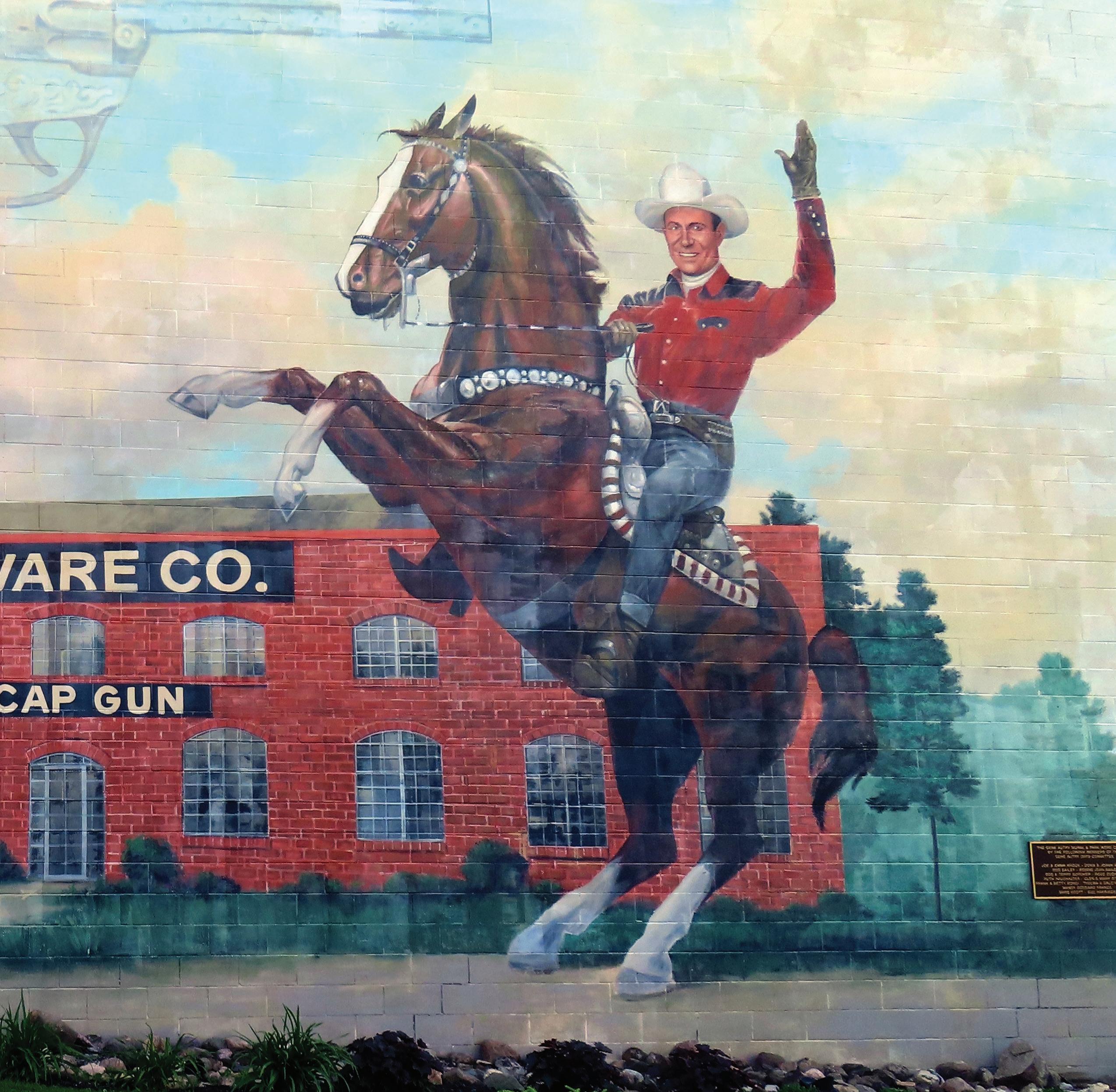
Singing Cowboy did five shows at the Kenton Theatre with his troupe of country-western performers. “Autry rode Champion into the theater,” says Striker, “and the horse left his hoofprints on the stage.” At Kenton Hardware, Autry posed for a group photo with employees, including Solomon and Monette Whitmore. “Mrs. Whitmore was the factory’s fastest Autry cap pistol assembler,” explains Striker. “She got paid by the piece.”
Material shortages forced Kenton Hardware to shut down during World War II, and after the war, it faced stiff competition from plastic and tin toys imported from Japan. The company closed in the 1950s, but Kenton never forgot Autry — and the Singing Cowboy likewise never forgot Kenton; he mentioned it and the Autry pistol in his 1978 memoir, Back in the Saddle Again.
In 2004, Kenton residents hired artist Keith Hasenbalg to paint a 30-foot-tall mural commemorating Autry and Kenton Hardware on the side of a building at the corner of West Franklin and Market streets near the Hardin County Courthouse (shown above).
Continued on page 30
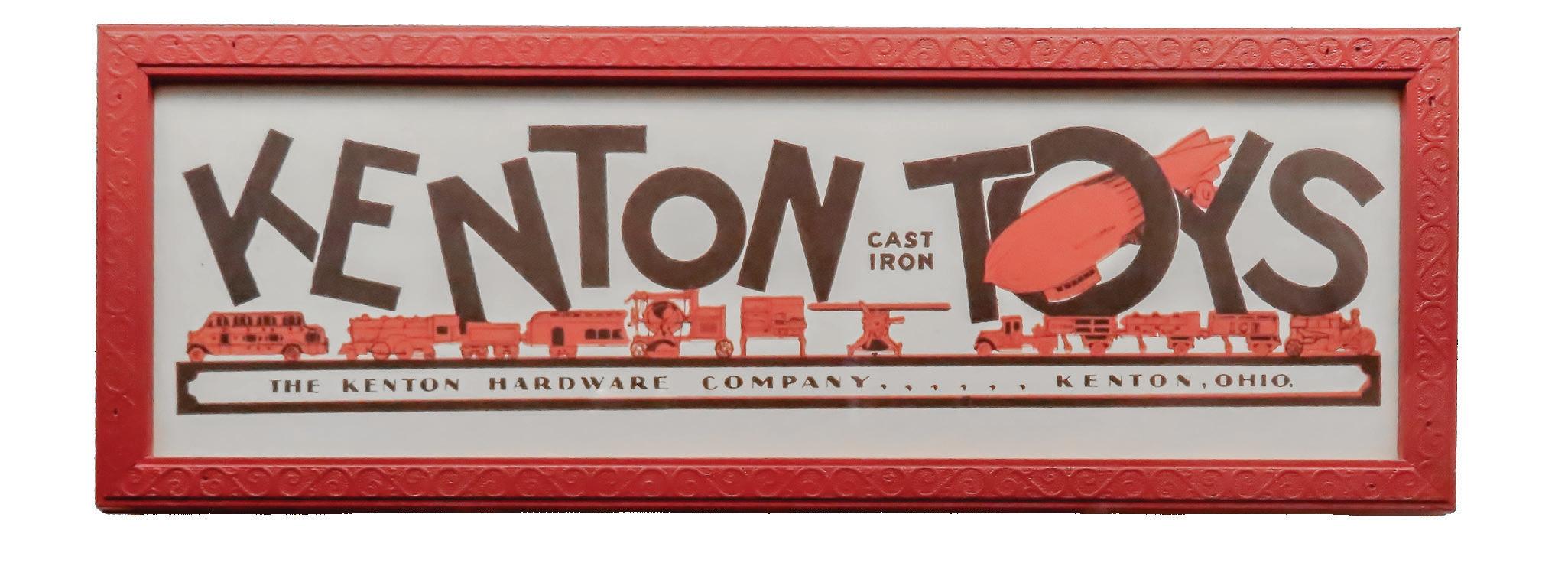
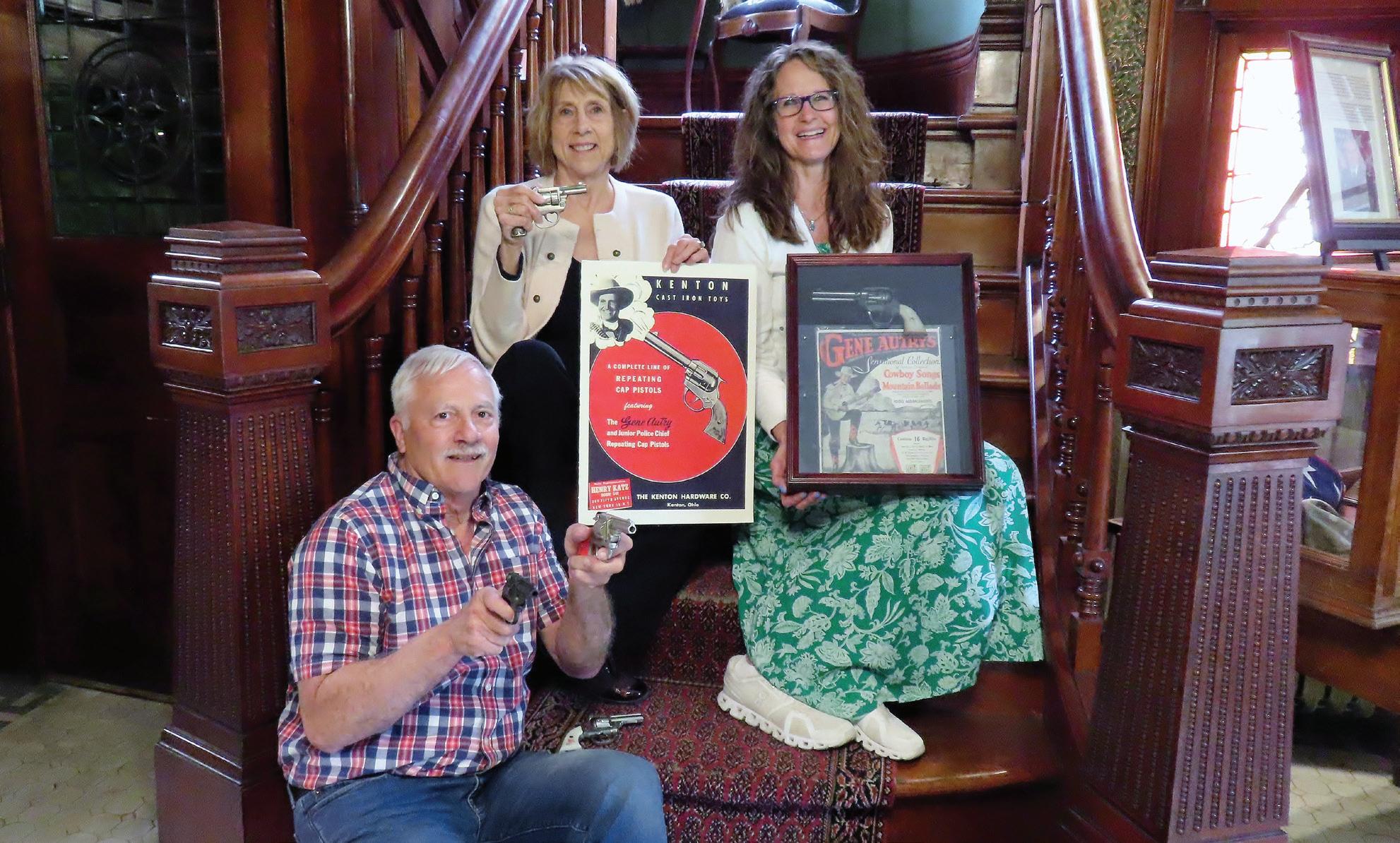
Continued from page 29
The mural depicts a smiling and waving Autry astride Champion with the brick toy factory in the background and two cap pistols in the sky. It’s the focal point of Gene Autry Mural Park, a small but pleasant green space with pretty gardens and wagon wheel-style benches. Appropriately enough, the huge mural and tiny park are catercorner from Kenton’s historic theater, which still shows movies nearly 90 years after Autry performed there.
When Phillips, a member of Mid-Ohio Energy Cooperative, bought the mural-sided building for his Financial Matters business, the transaction included the park property. Thus, even though Autry Park is open to the public, it’s privately owned by Phillips, who maintains the mural and the landscaping with his own funds and help from a local foundation. Kenton residents like Striker, who donated a new American flag for the park’s flagpole this year, lend support, too.

The Hardin County Historical Museums also celebrate Autry’s Kenton connection with an entire room full of cast-iron toys in the organization’s nearby SullivanJohnson House. Collection highlights include harness racing toys; a Buckeye ditcher; black-and-white photos of the Singing Cowboy at Kenton Hardware; and various Autry pistols with their original boxes. A white-handled repeating cap pistol is also displayed with a songbook Autry autographed in Kenton in 1938
Phillips, who grew up on a Hardin County farm, says he never could have anticipated that he’d be the caretaker of a mural that keeps the Singing Cowboy ingrained in Kenton’s collective memory. At the same time, he says he’s a music fan as well as a businessman, and he recently purchased three vintage Gene Autry albums at an auction — which he hopes will help keep that memory alive for future generations as well: “I think they’ll mean something to my children someday.”
Weʼ re your one-stop shop for all t hings spor ts—cour ts, gyms, and f ields. From t he f irst sketc h to t he f inal install, we handle t he whole process. Whet her it ʼs basketball, pic kleball, volleyball, or a little of ever yt hing, we build tur nkey spaces t hat get you playing f aster. Let ʼs get you into t he game!
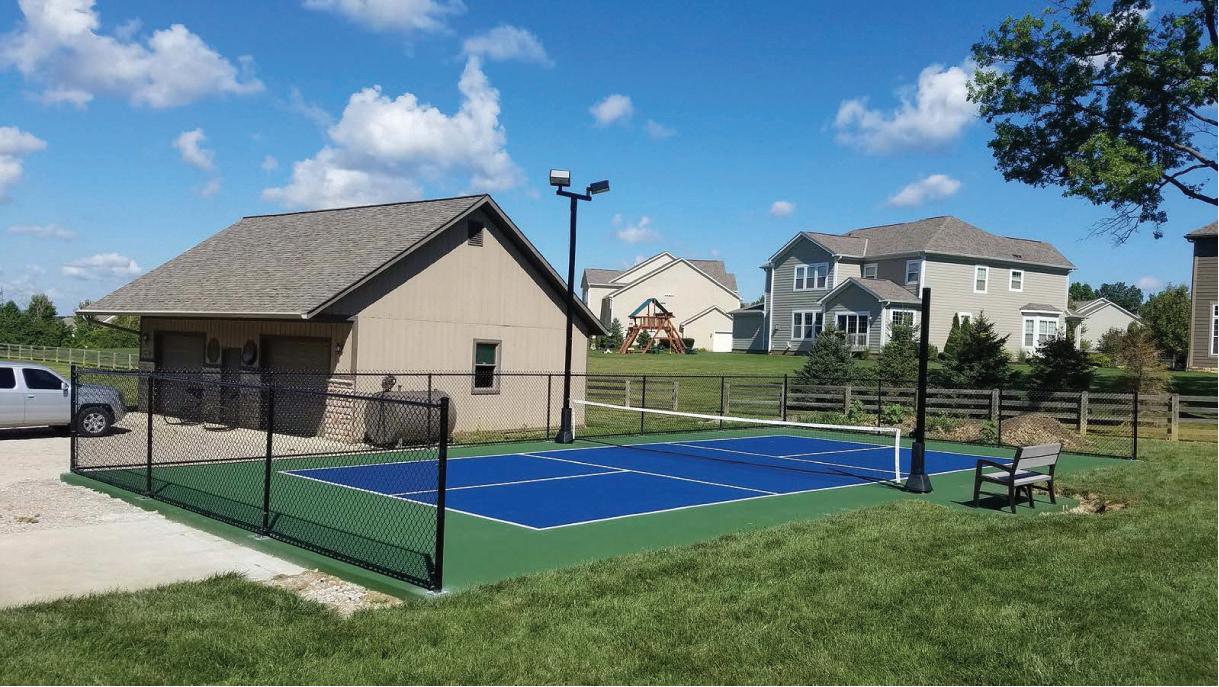

Spor tscape Blazers has been doing it since 1990so yeah, weʼve been around t he bloc k (and probably built a cour t on it). Weʼ re t he only local team of cour t, gym, and f ield builders. From planning to products to placement, residential or commercial, indoors or out, weʼve got you

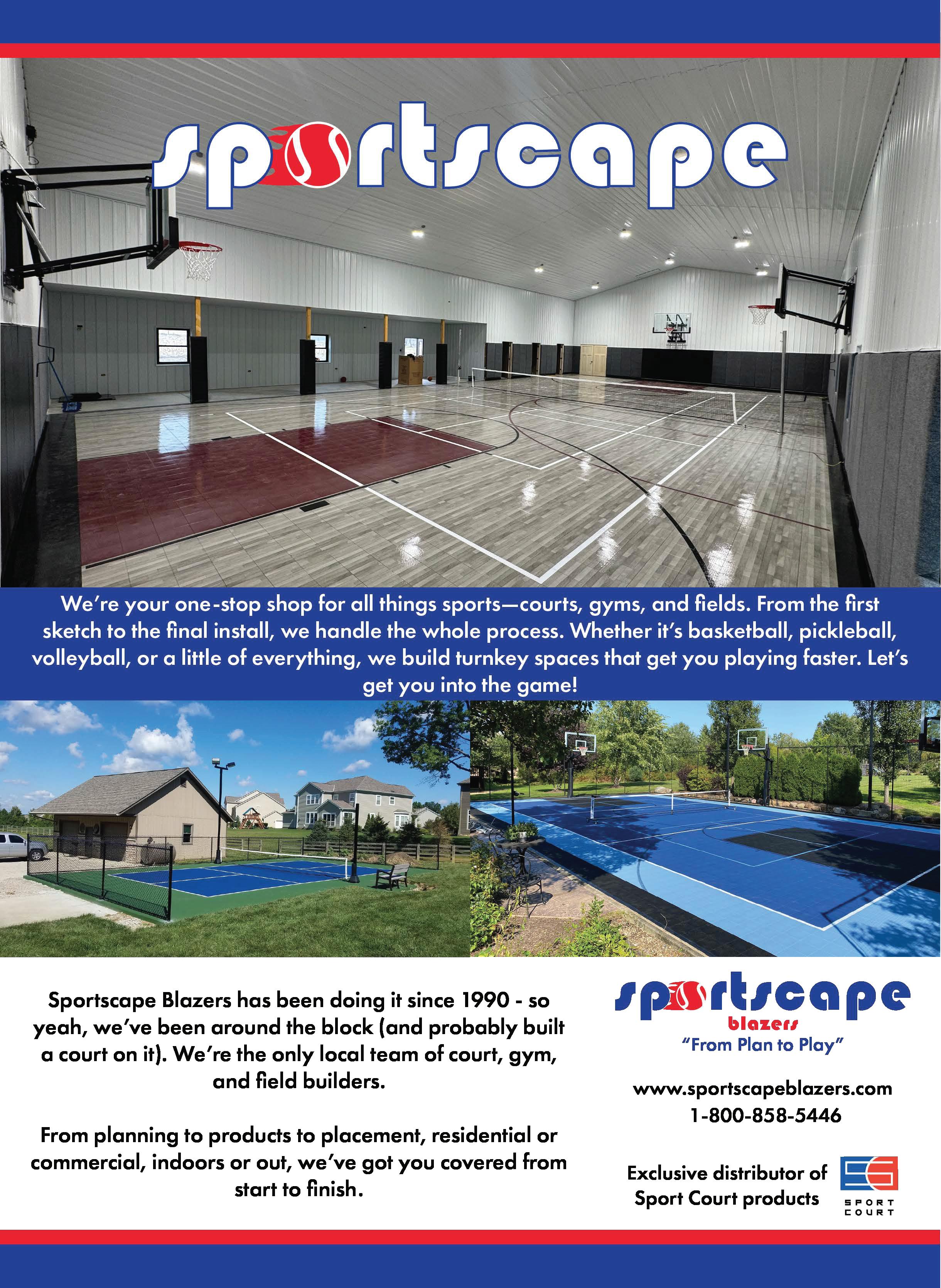










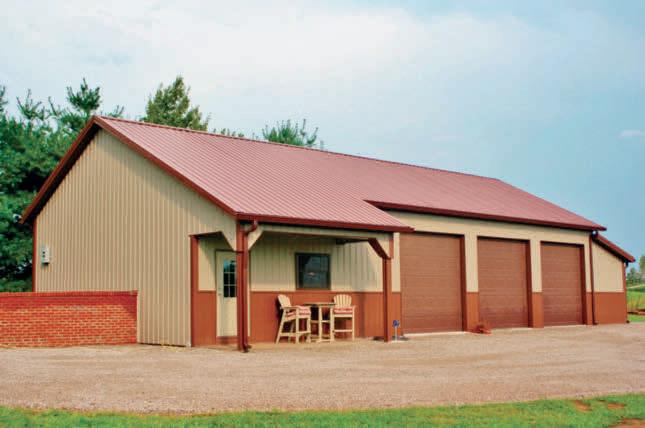




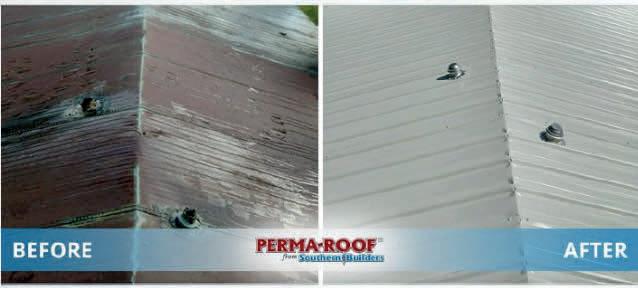





various trail surfaces. An adult must accompany all children under 12. For questions, email mellis@ pickwaycountyohio.gov.
AUG. 23 – Books in the Barn, 5530 Radnor Rd., Radnor, 10 a.m.–3 p.m. Unique vendor show featuring local Christian and family-friendly authors, arts and crafts, painting classes, mini-photo opportunities, baked goods, food truck, and more. 614-381-8191, mrsmaryrodman@gmail.com, or https://maryrodman.com.
THROUGH AUG. 24 – CAPA Summer Movie Series, Ohio Theatre, 55 E. State St., Columbus, Wed.–Sun. 7:30 p.m., cartoons Sat. 10 a.m., Sun. matinee 2 p.m. $5–$6. Series showcasing classic films and cult movies. Live music featuring the “Mighty Morton” Theatre Organ, one of the finest in existence. 614-4690939 or www.capa.com.
THROUGH AUG. 28 – Exhibitions at the MAC, Peggy R. McConnell Arts Center, 777 Evening St., Worthington. Free. Two exhibitions will be on display: My Voice and Dance by Said Oladejo-Lawal and In Good Company by Linda Hutchinson. The public is invited to a guided gallery tour by Oladejo-Lawal on Aug. 7 (7–8 p.m.) and by Hutchinson on Aug. 21 (7–8 p.m.). www.mcconnellarts.org.
THROUGH OCT. 3 – First Friday Car Show, 122 N. Court St., Circleville, 5–9 p.m. Come downtown on the first Friday of each month to enjoy a night of classic cars, community fun, and a vibrant uptown atmosphere. All cars welcome! www.pickaway.com.
THROUGH OCT. 25 – Coshocton Farmers Market, Skip’s Landing, 22375 Co. Rd. 1A, Coshocton, Sat. 8:30 a.m.–noon. Locally grown produce, baked goods, and artisan crafts. Rain or shine. www. facebook.com/coshoctonfarmersmarket or email market.manager@coshfarmmarket.org.
AUG. 16 – Boogie on the Blacktop: Creek Don’t Rise, 135 E. Main St., Circleville, 6–11 p.m. Soak up the sounds of soulful Southern rock and blues as the band delivers an unforgettable performance in the heart of Circleville! www.pickaway.com.
AUG. 21 – Thursday Trail Tour: Canal Park, 23352 Canal Rd., Circleville, 9:30 a.m. Free. Program will be canceled in the case of inclement weather. Please dress to be outside and for a walk along
AUG. 23 – Ferret Buckeye Bash, Ohio Expo Center, Rhodes Building, 717 E. 17th Ave., Columbus, 10 a.m.–6 p.m. Adult $5, child $2, family $12. Ferrets, vendors, raffles, shelters, and breeders. Fun events such as Tube Races, Best Dressed, and Paper Bag Escape. Pre-registration required for ferret showing entry. www.ferretbuckeyebash.org or fertbuckeyebash@aol.com.
AUG. 23 – “Raptors of Ohio: Birds of Prey,” Park Headquarters, 16405 U.S. Highway 23, South Bloomfield, 1 p.m. Join us for a fascinating presentation and guided walk exploring Ohio’s raptors: their adaptations, habitats, and role in the ecosystem. Dress appropriately for being outdoors. To register or for questions, email mellis@ pickawaycountyohio.gov.
AUG. 24 – Craft Show, Lancaster Campground Activity Building, 2151 W. Fair Ave., Lancaster, 9 a.m.–3 p.m. Free. Sponsored by the Fairfield County Genealogical Research Library. Numerous vendors and crafters, drawings, bake sale, and refreshments. 740-653-2573 or www.fairfieldgenealogy.org.
AUG. 29–31 – Coshocton Flint Festival and KnapIn, Coshocton Co. Fgds., 724 S. 7th St., Coshocton, Fri./Sat. 9 a.m.–5 p.m., Sun. 9 a.m.–2 p.m. $5 per vehicle. A fun, educational weekend for the whole family. Watch craftsmen make arrowheads, spear points, stone and bone tools. Rocks, gems, minerals; jewelry makers; atlatl demos. For camping and vendor info: 814-720 -7512 or 330-473-7014
AUG. 30–31 – Annual Dahlia Show, Greater Columbus Dahlia Society, Union County YMCA, 1150 Charles Lane, Marysville, Sat. 1–5 p.m., Sun. 1–4 p.m. Free and open to the public. Top dahlia growers in the Midwest will compete for recognition and cash prizes in dozens of categories. See hundreds of all types of dahlias as well as floral arrangements and photographs highlighting dahlias. www. columbusdahlias.com.
AUG. 29–31 – Labor Day Celebration, Oglebay Park Resort, 465 Lodge Dr., Wheeling. Live entertainment, face painting, balloon art, inflatables, Revolutionary War reenactments, a woodcarvers show, and a fireworks finale to remember. 304-2434000 or www.oglebay.com.
AUG. 29–31 – West Virginia Italian Heritage Festival, West Main Street, Clarksburg. Authentic Italian street food, complete with pastries; entertainment for all ages; vendors; carnival midway with rides and games; and much more. 304-6227314, wvihf@wvihf.com, or www.wvihf.com.
AUG. 30–SEP. 1 – Canal Winchester Labor Day Festival, historic downtown Canal Winchester. Free. Join us for the oldest and largest Labor Day festival in Ohio! Live music, midway rides, parade, car show, and much more. www.cwlaborday.org.
SEP. 2–5 – Learning Never Ends: Annual Art Show, Peggy R. McConnell Arts Center, 777 Evening St., Worthington. Free. www.mcconnellarts.org.
SEP. 4–6 – Marion Popcorn Festival, downtown Marion, 11 a.m.–midnight. Free. Parade Thur. 6 p.m. Food, rides, games, arts and crafts, entertainment, and popcorn for all! 740-387-FEST (3378) or www. popcornfestival.com.
SEP. 5 – First Friday Art Walk, downtown Zanesville, 5–8 p.m. Come downtown on the first Friday of each month, when all our participating galleries, studios, and small businesses are open at the same time! See our website for a map of current participants: https:// artcoz.org/arts-district-map.
SEP. 5–6 – Lithopolis Honeyfest, 5 E. Columbus St., Lithopolis, Fri. 3–7 p.m., Sat. 10 a.m.–7 p.m. Free admission/parking; shuttle transportation provided. Learn about the importance of the honey bee while enjoying artist booths, live music, wonderful food, fun, and people. Kids’ activities and sensory-friendly area. www.lithopolishoneyfest.com or follow us on Facebook or Instagram.
SEP. 6 – Marion Popcorn Festival 5K, Marion. Start line: Church at South Main. Registration/packet pickup, 8 a.m. Race at 9 a.m. Awards ceremony 10 a.m. Register at https://runsignup.com/Race/OH/ Marion/PopcornFestival5K.
SEP. 8, 15 – Friendly Ties Square Dance Club Lessons, Pickerington Senior Center, 150 Hereford Dr., Pickerington, 7–9:15 p.m. First two lessons are free; each Monday after that is $5 per person. Come join in the fun and reap the benefits — physically, mentally, and emotionally. For more information: 614316-5838, 614-778-7131, or www.friendlyties.org.
SEP. 13 – Heritage Day Festival, 27 E. Sandusky St., Chesterville (St. Rte. 95 at St. Rte. 314), 10 a.m.–7 p.m. Free. Vendors and crafters, food trucks, kids’ games, noon parade, cruise-in/tractor show, live music, pie auction, karaoke, history displays, library book sale, cornhole tournament, and much more! 419-545-9119 or www.facebook.com/heritagedayfest.
THROUGH AUG. 31 – Steubenville Catfish Crawl, downtown Steubenville. A dozen 8-footlong, intricately painted catfish will be on display around the downtown; grab a map and find them all! Maps available at Leonardo’s Coffeehouse, 159 N. 4th St., Steubenville, or online at www. steubenvillenutcrackervillage.com/catfish.html.
THROUGH OCT. 11 – “Quilts Galore!” Exhibit, McCook House Museum, 15 Public Square, Carrollton, Fri./Sat. 10 a.m.–5 p.m. Adults $5, children $3. Come see the plethora of talent our rural Carroll County has to offer. Enjoy the stories that accompany each hand-sewn and machine-made entry. 330-437-9715 or kathorn4120@gmail.com.
AUG. 9–10, 16–17, 23–24 – Shaker Woods Festival, 44337 County Line Rd., Columbiana, 9 a.m.–5 p.m. Over 200 crafters and artisans dressed in Shaker period clothing will demonstrate and sell their handmade wares. www.shakerwoods.com.
AUG. 12 – Zoar Free Speaker Series: “The Ohio Tea Company,” Historic Zoar Village, 198 Main St., Zoar, 11 a.m.–1 p.m. The speaker will discuss the history of tea and tea customs. Open to the public with free parking near the School House. 330-874-3011 or www. historiczoarvillage.com.
THROUGH AUG. 31 – Tecumseh!, Sugarloaf Mountain Amphitheatre, 5968 Marietta Rd., Chillicothe. $20–$75. Sit beneath the stars as sheer spectacle surrounds you with a herd of galloping horses, live military cannon in action, and dazzling battle sequences. www.tecumsehdrama.com.www. tecumsehdrama.com.
THROUGH NOV. 27 – Athens Farmers Market, Athens Community Center, 701 E. State St., Athens, Wed. 9 a.m.–noon. Open year-round Sat. 9 a.m.–noon. 740-593-6763, www.athensfarmersmarket.org, or www.facebook.com/afm.ohio.
AUG. 15 – Battle on the Beach, 1 N. Paint St., Chillicothe, 5:30–7:30 p.m. Free. The coaches and
AUG. 15 – Gruca White Ensemble, John Streeter Garden Amphitheater, 2122 Williams Rd., Wooster, 6:30 p.m. Free; registration recommended. Classical guitarist Robert Gruca and flutist Linda White will perform music from multiple cultures and genres. In the event of rain, concert will be held at the Secrest Welcome and Education Center. 419-853-6016 or www.ormaco.org.
AUG. 17–24 – Lorain County Fair, 23000 Fairgrounds Rd., Wellington. 440-647-2781 or www. loraincountyfair.com.
AUG. 23 – Jazz Under the Stars: Barbara Rosene, Uptown Park, Medina, 7 p.m. Bring your lawn chairs, blankets, and picnics. In the event of rain, concert will be held at St. Paul’s Episcopal Church, 317 E. Liberty St., Medina. 419-853-6016 or www.ormaco.org.
AUG. 23 – NE Ohio Historical Day, Painesville Railroad Museum, 475 Railroad St., Painesville, 10 a.m.–3 p.m. Visit this historic 132-year-old depot and our new Collinwood Engine Barn. Shop at the Model Train Flea Market. Food and drinks available for a small donation. 216-470-5780, prrm@att.net, and www.painesvillerailroadmuseum.org.
AUG. 23–24, AUG. 30–SEP. 1 – Great Trail Arts and Crafts Festival, Great Trail Festival Grounds, 6331 Canton Rd., Malvern, 10 a.m.–5 p.m. $5–$7, under 10 free. Celebration of American folk art, with distinctive arts and crafts, living history, period music, a variety of kettle-cooked food, and more. 313-278-7372 or www. greattrailfestival.com.
AUG. 30–31 – Fall at The Farmhouse, 1087 St. Rte. 534 SW, Newton Falls, 9 a.m.–3 p.m. Over 50 vendors selling handmade items and gifts, live music, food trailers, and all things fall! https://trulytrumbull.com/ events/fall-at-the-farmhouse.
SEP. 5 – First Fridays on Fourth, 155 N. 4th St., Steubenville, 6–10 p.m. Free. Storybookthemed celebration featuring art, crafts, games, food trucks, live entertainment, and
family members of local area high school volleyball teams will be battling it out on the sand for a chance to win $1,000 for their child’s school volleyball program. www.downtownchillicothe.com.
AUG. 16 – Classic Cruise-In Car Show, Wheeling Avenue, Cambridge. Free. Join us for a day of cars, music, food, and a little shopping! Registration begins at 9 a.m. www.downtowncambridge.com.
AUG. 16 – Sands in the Streets, 1 N. Paint St., Chillicothe, 10 a.m. Free. We unload 300 tons of sand on the downtown streets to welcome volleyball teams and spectators back for a day of competition and fun, with 8 semi-professional, 8 competitive, and 32 recreational teams and four courts! www. downtownchillicothe.com.
AUG. 17 – Shakespeare on Sugarloaf: The Tempest, Sugarloaf Mountain Amphitheater, 5968 Marietta Rd., Chillicothe, 7:30 p.m. Free. This production is part of a major initiative of The Scioto Society, Inc., to provide free Shakespeare to southern Ohio and is presented in part by the Ohio Arts Council. www. tecumsehdrama.com.
AUG. 23 – Kipling VFW Post 7371 Heroes and Hot Rods Car Show, 61771 Primrose Lane, Kipling. Free admission and open to the public. Participating car, bike, tractor, and motorcycle entries ($10 fee), 9–11 a.m. Awards at 1 p.m. Free haircuts for veterans, 11
activities to stimulate the imagination. www. theharmoniumproject.org/first-Fridays.
SEP. 6–7 – Pioneer Days, Historic Lyme Village, 5001 St. Rte. 4, Bellevue, 10 a.m.–4 p.m. Composed of three log houses, a one-room schoolhouse, log church, blacksmith shop, general store, 1836 farmhouse used by the Underground Railroad, and more, the Village comes alive with costumed reenactors, encampments, and demonstrators. www. lymevillage.org.
SEP. 6–11 – Wayne County Fair, Wayne Co. Fgds., 199 Vancouver St., Wooster, gates open 8 a.m. $4 at gate. Ohio’s foremost agricultural fair. 330-262-8001 or www.waynecountyfairohio.com.
SEP. 7 – Rachel Brown: “Songs and Stories,” Wadsworth Public Library, 132 Broad St., Wadsworth, 2–3 p.m. Free. A favorite singer and pianist in northeast Ohio, Rachel will be singing a mix of well-known tunes and her own originals as well as telling stories drawn from her life. Seating will be on a first-come, first-served basis. 419-853-6016 or www.ormaco.org.
SEP. 8–21 – “Celebrate the Constitution,” Historic Fort Steuben, 120 S. 3rd St., Steubenville, Mon.–Sat. 10 a.m.–4 p.m., Sun. 11 a.m.–4 p.m. Free. Annual exhibit and activities focusing on the nation’s founding document and the issues and personalities of the time. 740-283-1787 or www.oldfortsteuben.com.
SEP. 12–14 – Lordstown Apple Cider Festival, Lordstown Center, 1776 Salt Springs, Lordstown. Free admission/parking. Arts and crafts, car shows, food, fireworks, games, parade, rides, free entertainment, and fresh apple cider! https://trulytrumbull.com/ events/lordstown-apple-cider-festival-2
SEP. 13–14 – Fall in the Woods, Hartford Hill Winery, 3864 Bushnell Campbell Rd., Fowler, 10 a.m.–4 p.m. Specialty vendors, food, wine, coffee trailer, live music, and much more. 330-772-8040 or https:// trulytrumbull.com/events/fall-in-the-woods-2025
a.m.–1 p.m. Chickens on the spit, $12 each. 50/50 and Cooler of Cheer raffles; silent auction. For information, call Howard at 740-260-1399
SEP. 5–7 – Rarden Whitetail Deer Festival, Rarden Community Park, 1363 Main St., Rarden (St. Rte. 73), Fri. 5–10 p.m., Sat. 10 a.m.–10 p.m., Sun. 10 a.m.–6 p.m. Free. Hunting and craft vendors, live entertainment, buck wall, archery tournament, food vendors, coyote hunts, deer scoring on Saturday, pageants, raffles, kids’ events. 937-725-0631 (Jackie), www.facebook.com/RardenFestival, or www. rardendeerfest.com.
SEP. 5–7 – Ohio River Sternwheel Festival, Ohio River Levee, Marietta. Sternwheeler races, car show, pageant, 5K, entertainment, food, and fireworks. 740373-5178 or www.sternwheel.org.
SEP. 6 – Youth Wings ’n Wheels Fly In and Drive In, Cambridge Municipal Airport, 9732 Brick Church Rd., Cambridge, 9 a.m.–3 p.m. Free. Join us for a car show, plane displays, kids’ activities, food trucks, and demonstrations. https://cambridgeflyin.my.canva.site.
SEP. 12–14 – Ohio Pawpaw Festival, Lake Snowden, 5900 U.S. 50, Albany. Fun-filled and educational community event celebrating one of America’s largest native tree fruits, with food, entertainment, contests, arts and crafts, and much more. www. ohiopawpawfest.com.
THROUGH SEP. 14 – NWORRP Museum Summer Hours, Northwest Ohio Railroad Preservation Inc., 12505 Co. Rd. 99, Findlay, Sat./Sun. 1–4 p.m. $3; 12 and under, $2. Quarter-scale train rides, model train displays, museum tours, games, play area, and more. 419-423-2995, www.nworrp.org, or www.facebook. com/nworrp.
THROUGH OCT. 11 – The Great Sidney Farmer’s Market, 109 S. Ohio Ave., every Sat. 8 a.m.–noon. Vendors from all around the area provide great food, crafts, and more. 937-658-6945 or www.facebook. com/sidneyfarmersmarketoh.
AUG. 6, SEP. 3 – Down on the Farm Story Time, Proving Ground Farm, 5670 E. Twp. Rd. 138, Tiffin, 10 a.m. Stories and activities geared for preschool-age children that focus on farming and nature. Families welcome! 419-447-7073, www.conservesenecacounty. com, or Seneca Conservation District on Facebook.
AUG. 7–10, SEP. 6–7 – Bucyrus Flea Market, Crawford Co. Fgds., 610 Whetstone St., Bucyrus, 9 a.m.–3 p.m. Free admission. 419-569-7008 (David M. Staats) or www.crawfordcofair.com/annual-events.
AUG. 9–10 – Findlay Flea Market, Hancock Co. Fgds., 1017 E. Sandusky St., Findlay, Sat. 9 a.m.–4 p.m., Sun. 9 a.m.–3 p.m. Free admission. New, used, and vintage items, crafts, and more. Food trucks onsite. Vendors welcome! For more information, contact
THROUGH SEP. 1 – Rib City BBQ & Bluegrass, 746 NW Washington Blvd., Hamilton, Mon. 7–9 p.m. Free admission. Enjoy an evening of lively bluegrass music by Vernon McIntyre’s Appalachian Grass. Call 513829-7427 before traveling.
THROUGH SEP. 24 – Bluegrass Wednesdays, Vinoklet Winery, 11069 Colerain Ave., Cincinnati, Wed. 6:30–8:30 p.m. Enjoy dinner, wine, and an evening of free entertainment by Vernon McIntyre’s Appalachian Grass. Reservations recommended. 513-385-9309, vinokletwinery@fuse.net, or www.vinokletwines.com.
AUG. 1–NOV. 30 – Pumpkin Blow, Neusole Glassworks, 11925 Kemper Springs Dr., Cincinnati, Wed./Thur. 10 a.m.–6 p.m., Fri.–Sun. 10 a.m.–8 p.m. (except for Thanksgiving Day). $55 per 30-minute session. Must be age 5 or older. Make
Christine at 419-619-0041 or futrellcg1@gmail.com or find us on Facebook.
AUG. 15–23 – Allen County Fair, Allen Co. Fgds., 2750 Harding Hwy., Lima, 7 a.m.–11 p.m. Singleday ticket, $10; 6 and under free! Free parking. Big-name entertainment, showcase of bands, truck competitions, harness racing, demolition derby, cheerleading competition, and more. www. allencofair.com.
AUG. 16–17 – Family Fun Weekend: “Back to School Bash,” 12505 Co. Rd. 99, Findlay, 1–4 p.m. $5 per person. Games, quarter-scale train rides, bounce house, and other family friendly activities and events. 419-423-2995, www.facebook.com/ nworrp, or www.nworrp.org.
AUG. 17 – Sunset Jazz, Towpath Trail, Grand Rapids, 2 p.m. to dusk. Free admission. Fantastic lineup. Food and beverages for purchase. Bring lawn chairs. NO coolers allowed. www.grandrapidsartscouncil.org.
AUG. 27 – Happy Together Tour, Veterans Memorial Civic and Convention Center, #7 Town Square, Lima, 7 p.m. $56+. Featuring your favorite artists from the ’60s and ’70s, such as The Turtles, Jay and The Americans, The Cowsills, and Gary Puckett and the Union Gap. www.limaciviccenter.com/happytogether.
AUG. 29 – Voyage: Celebrating the Music of Journey, Pangle Pavilion, 128 E. Spring St., Lima, 7:30 p.m. $36+. The world’s premier Journey tribute band re-creates the legendary sound, energy, and passion of one of rock’s greatest bands. www.limaciviccenter. com/panglepavilion.
AUG. 29–30 – Annual Jet Fly at LARKS (Lima Area Radio Kontrol Society), LARKS Flying Field, 7651 Elida Rd., Elida, Thur./Fri. 4–9 p.m., Sat. 9 a.m.–4 p.m. Landing fee $30. Spectators free! All electric and turbine jets welcome. Beautiful grass runway. 260-701-8936 (Ron Ballard) or www.facebook.com/ LARKSCLUB/events.
AUG. 29–31 – Perch, Peach, Pierogi, and Polka Festival, downtown Port Clinton, Fri. 4–9:30 p.m.,
your own blown-glass pumpkin from hot molten glass! Reservations required. 513-751-3292 or neusoleglassworks@hotmail.com.
AUG. 15–23 – The Great Darke County Fair, Darke Co. Fgds., 800 Sweltzer St., Greenville, 7 a.m. to midnight. $9; under 12 free with adult admission. $30 for 9-day pass. 937-548-5044 or www. darkecountyfair.com.
AUG. 16 – Free Family Program: “Fascinating Fossils,” Wagers’ Memorial Park (Devils Backbone), 1301 OH-725 W., Camden, Sat. 10 a.m.–12 p.m. Join naturalists Doug and Amy Horvath for a hike and identify fossils. 937-962-5561, pcpdevents@gmail. com, or www.preblecountyparks.org.
AUG. 23 – Tour De Donut, downtown Troy. A fun, unique bicycle event, where your ability to eat donuts is just as important as your ability to ride your bicycle fast! Kick off the weekend on Aug. 22 with the Donut Jam in downtown Troy, 5–11 p.m. www. thetourdedonut.com.
AUG. 29–31 – Oktoberfest, Liberty Home German Society, 2361 Hamilton-Cleves Rd. (Rte. 128), Hamilton, Fri. 6–11 p.m., Sat. 1–11 p.m., Sun. 1–8 p.m. Food, music, German beer, fun for kids. 513-5716198, www.libertyhome.net, or the Liberty Home Association Facebook page.
SEP. 5–7 – Vinoklet Art and Wine Festival, 11069 Colerain Ave., Cincinnati, Fri. 5:30–11 p.m.,
Sat./Sun. 11 a.m.–9:30 p.m. $8/day; under 18 free. Lake Erie yellow perch sandwiches and dinners, pierogies, Polish sausage, peach pie and ice cream, polka music, and more! Polka lessons Sat./Sun. 4 p.m. 419-341-9226 or www.kofc1750.org.
AUG. 29–SEP. 1 – St. Bernard Specialty Dog Show, Lima Kennel Club, 1050 Thayer Rd., Lima, 9 a.m.–5 p.m. Free; $5 parking. Exhibitors and dogs come from all points of the U.S. for conformation showings of the St. Bernard dog breed. Food vendors; vendors for dog supplies/paraphernalia. www.infodog.com.
SEP. 6 – Fall at The Farmhouse, 11351 E. Twp. Rd. 44, Attica, 10 a.m.–3 p.m. Free parking. Come welcome fall with us! 25+ vendors and food trucks; coffee truck. www.facebook.com/loriniedermier or 419-561-7919.
SEP. 6 – Hobo Dinner, AuGlaize Village, 12296 Krouse Rd., Defiance. Fundraising event. 419990-0107, villageauglaize@gmail.com, www. auglaizevillage.com.
SEP. 6 – Ohio’s Tree Farm of the Year Tour, Moser Woods Tree Farm, 12300 Bentley Rd., Bluffton, 10 a.m.–3 p.m. Free. Learn about managing a woodland for a variety of uses, including timber, recreation, water, and wildlife. Guided tours, displays, seminars, and kids’ activities. Food and beverages available on-site for purchase. 419-721-1465
SEP. 7 – Findlay Fall Model Train Show, Northwest Ohio Railroad Preservation Inc., 12505 Co. Rd. 99, Findlay, 10 a.m.–3 p.m. $5; 12 and under free with adult admission. Vendors will display and sell model trains, toy trains, and railroad memorabilia. Quarterscale train rides: adults $3, children $2 419-423-2995, www.facebook.com/nworrp. or www.nworrp.org.
SEP. 12–14 – Lake Loramie State Park Fall Harvest Festival, 11070 St. Rte. 362, Minster, Fri. 4–11 p.m., Sat. 8 a.m.–11 p.m., Sun. 8 a.m.–4 p.m. Free parking/ admission. Camping, antique tractor power show, craft vendors, beer garden, live music, kids’ activities, ventriloquist, magician, kiddie tractor pull, and more. 937-295-2011 or www.lakeloramiefallfest.com.
Sat. 11 a.m.–11 p.m., Sun. 12–8 p.m. Enjoy dancing, singing, shopping, playing, and lots of free fun in one of the most beautiful places in Cincinnati! Food and beverages available for purchase on-site. 513-385-9309, vinokletwinery@fuse.net, or www. vinokletwines.com.
SEP. 6 – A Taste of Harrison, The District, Harrison. Free admission. All-day festival with local crafters, live music, and good food! Vernon McIntyre’s Appalachian Grass entertains from 7 to 10 p.m. with lightning-fast instrumentals, close harmonies, and entertaining novelty songs. For more information, contact the City of Harrison at 513-367-2111
SEP. 6 – Vernon McIntyre’s Appalachian Grass, Vinoklet Art and Wine Festival, 11069 Colerain Ave., Cincinnati, 12–3 p.m. Free. 513-607-1874, fotmc@ iglou.com, or www.fotmc.com.
SEP. 7 – Open House: “A Grand Event,” White Water Shaker Village, 11813 Oxford Rd., Harrison, 2–5 p.m. Free. Everyone is invited to come celebrate Grandparents’ Day with us. Hands-on activities for the whole family. www.whitewatervillage.org.
SEP. 13 – The aMAZing 5K Trail Run, Garber Nature Center, 9691 OH-503 N., Lewisburg, 8 a.m. registration, race at 9 a.m. $20 or $30 with T-shirt; 12 and under, $10 or $20 with T-shirt. 937-962-5561, pcpdevents@gmail.com, or www. preblecountyparks.org. Register at https://runsignup. com/Race/Register/?raceId=144315
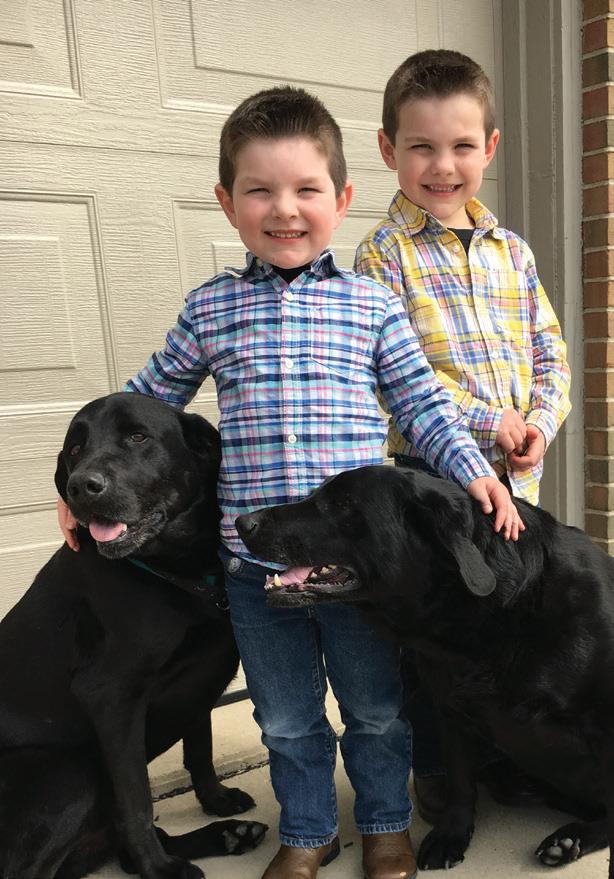



1 Turk and Derby, two smiley dogs with their two best friends, Levi and Parker. Andrew Bushman, Midwest Electric, Inc., member
2 — Our new puppy, Penny, finds the perfect nap position. Sarah Lonsinger, Pioneer Electric Cooperative member
3 — Ruby, Max, and Clementine, always ready for an adventure outside with dad. Susie Coldren, South Central Power Company member
Send us YOUR picture!


4 Chase, enjoying some lovin’ from mom. Autumn Swartz, Logan County Electric Cooperative member
5 Maia, enjoying the warm lap of her best friend: my husband, John. Sandra Troester, Buckeye Rural Electric Cooperative member
6 — Olly is soaking up the sun! Cindy Lovejoy, URE–Union Rural Electric Cooperative member
Upload your photos at www.ohiocoopliving.com/memberinteractive. For November, send “Thanksgiving table” by August 15. For December, send “Snow scenes” by September 15. Your photo may be featured in our magazine or on our website.
Enter to win a $100 CREDIT on your electric bill!*
Simply fill out this form and drop it off at the Ohio's Electric Cooperatives Education Center on Wheat Street during the 2025 Farm Science Review.
be
Join us at the
Name:
Electric co-op name:
Email address:
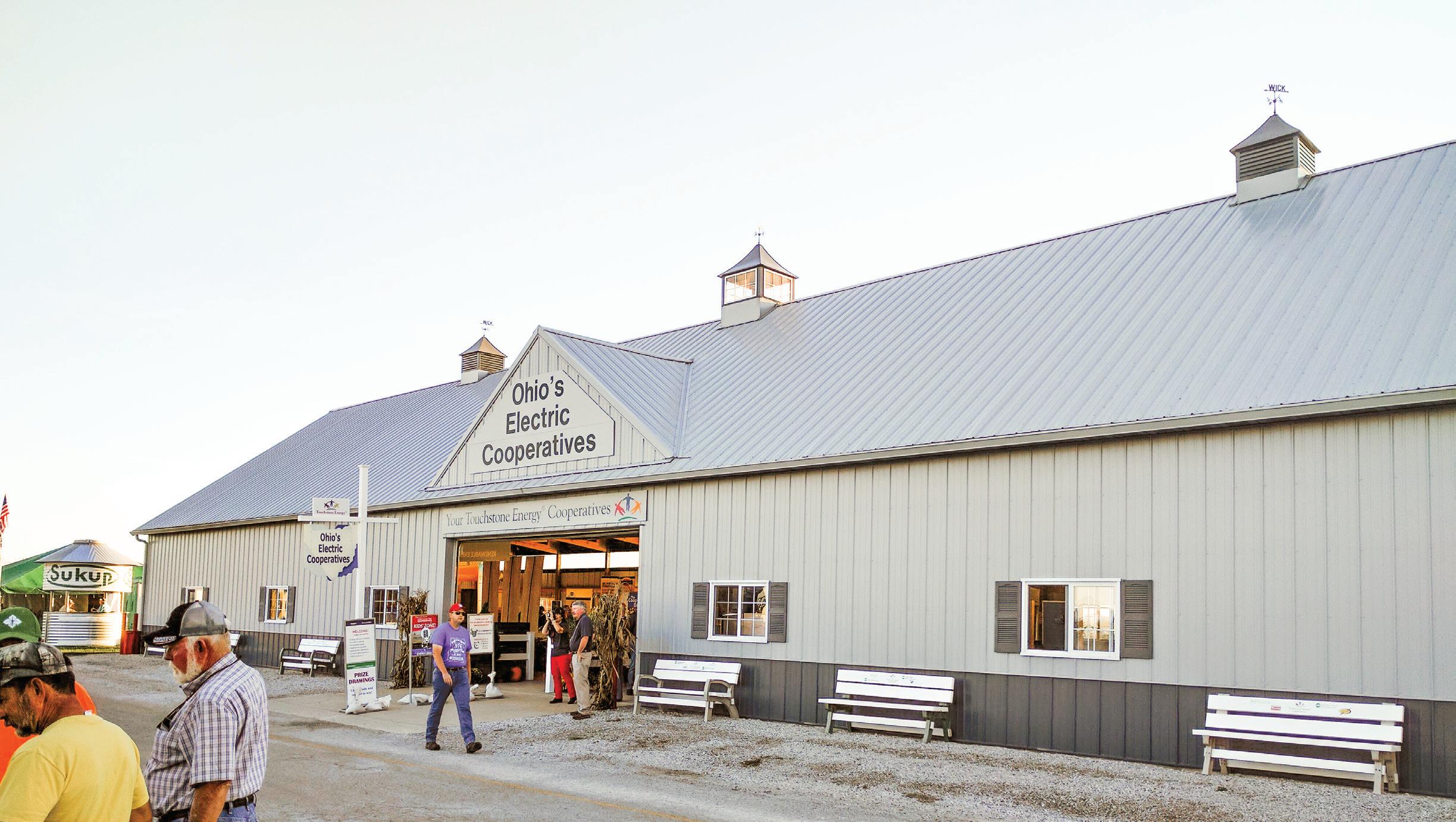
Molly Caren Agricultural Center | London, Ohio
September 16-18, 2025
STOP BY OUR BUILDING!
Using energy wisely is important — on the farm and in the home.
When you attend the Farm Science Review, make sure to visit the NEW Ohio’s Electric Cooperatives Education Center to find exhibits, energy-saving tips, demonstrations, and free popcorn!
Farm Science Review, sponsored by Ohio State University, is the largest agricultural event in our region, drawing more than 130,000 visitors every year. It’s a fun, educational event for farmers and non-farmers alike.
